K List of Movie Reviews
(For optimum viewing, adjust the zoom level of your browser to 125%.)
K-19: The Widowmaker (2002)
Rate:
5
Viewed:
6/25
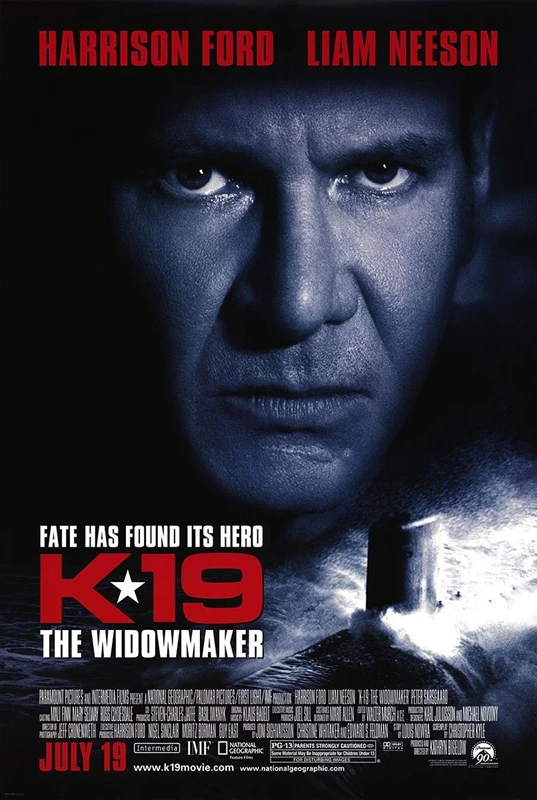
6/25:
Am I being harsh by giving K-19: The Widowmaker a '5'?
Maybe. The first hour was never engaging, causing me to wonder what the point was supposed to be, although I wasn't
under any illusion this was going to be another Das Boot. Finally, the
conflict came when there was a radiation leak in the reactor coolant system due to rushed construction of the
submarine. So, the commanding officer, played by Harrison Ford, was forced to decide whether to fix it or abandon
the ship after going through brief heated battles with his executive officer (Liam Neeson) à la
Run Silent, Run Deep, not
Crimson Tide.
The incident eventually cost the lives of eight men within a few weeks and then fourteen more the next two
years because the submarine was full of radiation. Interestingly, in 2006, Mikhail Gorbachev nominated the
crew of K-19 for Nobel Peace Prize. That would be equivalent to constructing a faulty building on your own
and then saving people in there afterwards when it started to fall apart.
In reality, the story is different. The failed bottle-breaking ceremony occurred in 1959. The submarine had
done a lot of sea trials for a year, starting in 1960, and then, there was the secret accident that happened
on July 4, 1961. It's not clear if launching an intercontinental ballistic missile caused the reactor coolant
system to break down as shown in the film. Either way, it was a welding mistake during construction that became
the primary reason why. The submarine had no nickname to begin with but got labeled "Hiroshima" afterwards. By the
way, the physical effects of radiation damage are actually worse than what's shown on screen.
All in all, Kathryn Bigelow wastes too much time going through the banalities in K-19: The Widowmaker
before finally getting to the bottom of it.
Kaleidoscope (1990)
Rate:
7
Viewed:
4/24

4/24:
Although strong and thought-provoking, the family topic of Kaleidoscope proves to be too ambitious for
everybody involved.
The breakup of three sisters and their reunion thirty years later are compelling stuff. How awkwardly everybody
feels about it is appropriate enough. It's mostly because they don't know what to say and can't believe their
unique situation. Two thoughts will constantly appear in their heads: how much they've missed out and how it might
change the current relationships they have with their adopted parents. As the oldest sister, Hilary has a
different perspective only because she can remember.
Given what happened, it's unfair to criticize the acting performances, especially by Jaclyn Smith. Perry King
starring in a Danielle Steel movie is a big treat, but their characters' romance throws the
whole film off balance. In other words, it isn't appropriate at the time being because the main premise is
too heavy to deal with, setting up Hilary as an emotionally vulnerable person despite John Chapman's well-meaning
intentions.
Meanwhile, the production values are high which is the main reason why Danielle Steel films are first class
all the way through. The interior sets are excellent. They've sure found a lot of great-looking places to shoot
the film in along with a solid cast.
All in all, in spite of giving it a good try, Kaleidoscope wasn't ready to handle such a deep topic.
Kalifornia (1993)
Rate:
4
Viewed:
3/03, 9/10
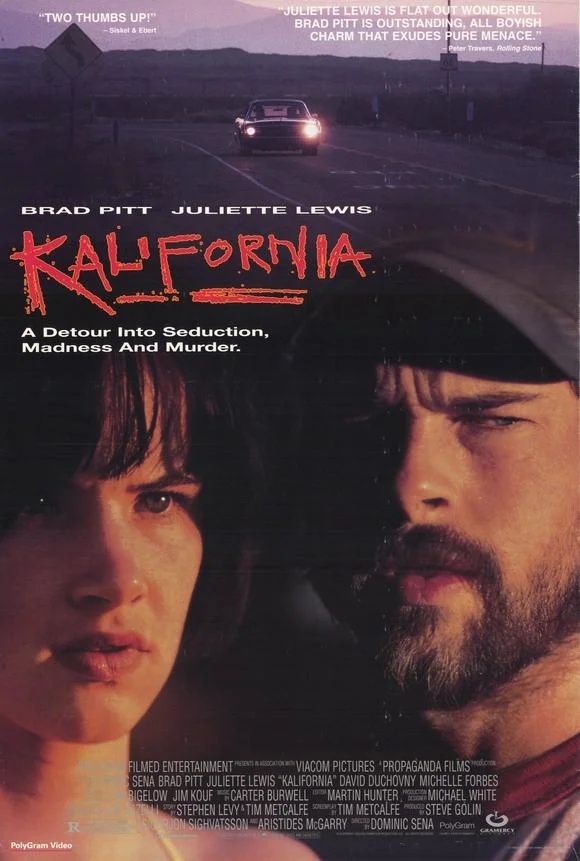
9/10:
Off to a good start, Kalifornia was succeeding with winning performances by Brad Pitt and Juliette Lewis.
Disturbingly, David Duchovny was uttering many over-the-top macabre lines, but I was okay with it as long as
the film would go somewhere. About one hour later, a full realization was made that it was just not working out.
Then, Kalifornia began to crawl to a slow death before falling apart before my eyes. All I can say is
the premise had promise.
During one scene in Nevada, when David Duchovny's character drove the truck before flipping over, it should've
made a big mess. Instead, I'm taken to the next day. Why bother going for the killer when the cops should be
called in because they're more equipped to handle the matter?
All in all, Kalifornia is disappointing.
Kama Sutra: A Tale of Love (1996)
Rate:
2
Viewed:
3/05, 7/08

7/08:
Kama Sutra: A Tale of Love tells a boring tale of love and walks a fine line between soap opera and soft porn.
There isn't much of a plot throughout, and nothing interesting ever happens. The acting is okay, but the
performances aren't convincing enough to fit the period of time.
Among the thespians, they evince no chemistry, making it hard for me to believe in their sentiments. Whenever a new subplot is
brewing, it's not followed through well. Meanwhile, I had hoped the film would be sexy enough to wash away the negatives
but to no avail. Nudity is taken as far as possible, but it serves no purpose and where were the Kamasutra sex positions?
From a technical standpoint, The Last Emperor set the standard of making the foreign
culture come alive in the background, but Mira Nair fails to capitalize on it for India. Regardless, the cinematography saves
the film from earning '1', but why bother setting the story in the 16th century?
With fifteen minutes left, when Tara entered Raj Singh's room, she should've sliced off his balls
and slashed his throat as an act of retribution. But the opposite happens, signalling the end of Kama Sutra: A Tale of Love
for me. It's impossible to be sympathetic with Maya's problems as she's essentially a prostitute.
All in all, Kama Slutra: A Tale of Pussy is more like it.
Kansas (1988)
Rate:
7
Viewed:
1/09
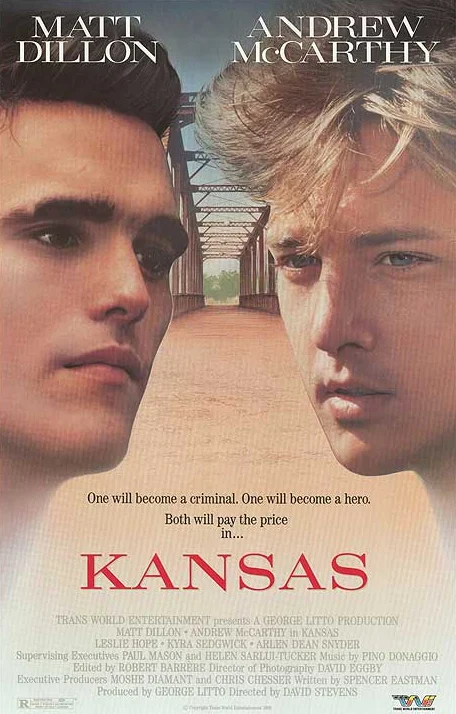
1/09:
Kansas works the best whenever Matt Dillon appears because of his magnetic personality; otherwise, the movie has nothing.
There are similarities between Doyle Kennedy and Fred Frenger of Miami Blues as they're of
the same cloth: engaging, dominating, and personable yet eccentric and psychopathic.
On the other hand, the poor Andrew McCarthy can't carry the weight on his back when he's left unattended. His scenes with
Leslie Hope are weak to muster any care from me. Each time a conflict arises, they both fail to make something out of nothing.
That's why Matt Dillon is a gifted actor.
All in all, because of Matt Dillon, Kansas has enough energy to keep up my interest throughout.
Kansas City Confidential (1952)
Rate:
5
Viewed:
10/15
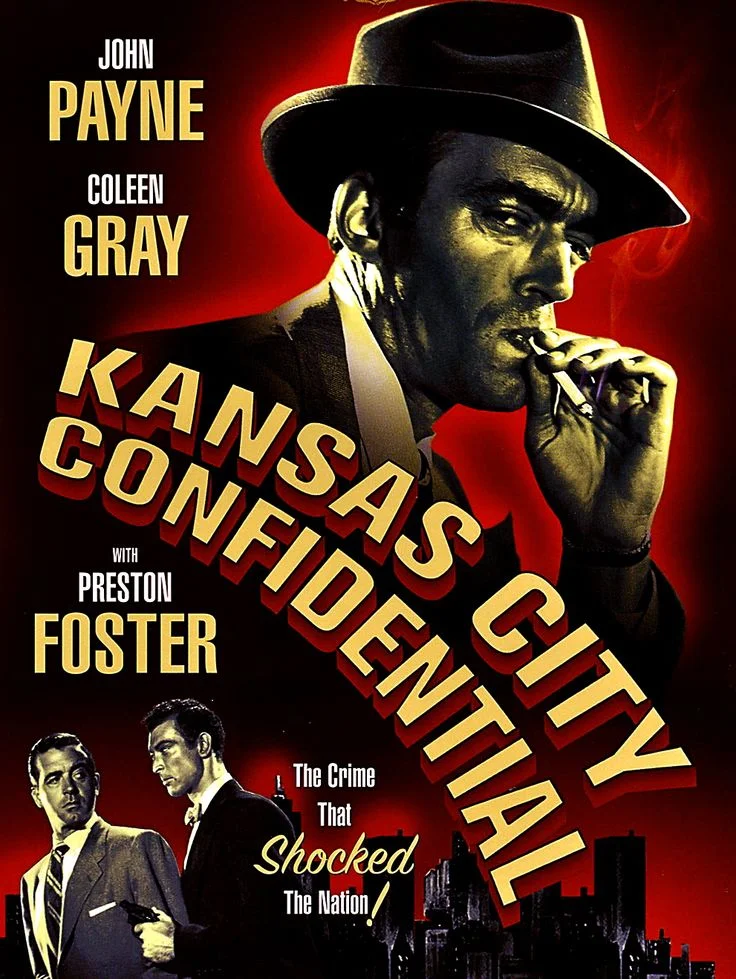
10/15:
Don't you hate it when the title of a film mentions the name of a city yet doesn't takes place there?
That's what happened in Kansas City Confidential. Sure, it's a catchy title, but the reality is: most of
the action occurs in Mexico. They might as well call it Mexico City Confidential.
Everybody tries too hard to be tough, and the acting is bad all around. John Payne's performance is the worst;
he resembles too much of a family man and thus isn't believable.
There isn't much of a story; it's simple, straightforward, albeit stupid, and linear that predictably goes
from point A to point B with no twists and turns. It's like watching a bad low-budget film which happens to
have high production value.
All in all, Kansas City Confidential isn't all it's cracked up to be.
The Karate Kid (1984)
Rate:
8
Viewed:
4/04, 3/13

3/13:
Back then, The Karate Kid was laughably corny to watch.
And now, it's not bad although there are several scenes that still make me cringe. I understand the subtlety
as to why Mr. Miyagi had Danielle do a specific job in a certain way.
The Karate Kid will always be the film that Pat Morita and Ralph Macchio are remembered for the rest of
their lives. The latter, one of the worst actors ever to grace the 80's, does a decent job of behaving in a
particular way in order for his character to work.
As for the negatives, I find it hard to believe Danielle, a total wimp with mere two months of training, can
defeat all the experienced boys in karate. It's not likely.
All in all, The Karate Kid gets the point across, but it's so corny.
The Karate Kid Part II (1986)
Rate:
5
Viewed:
3/13
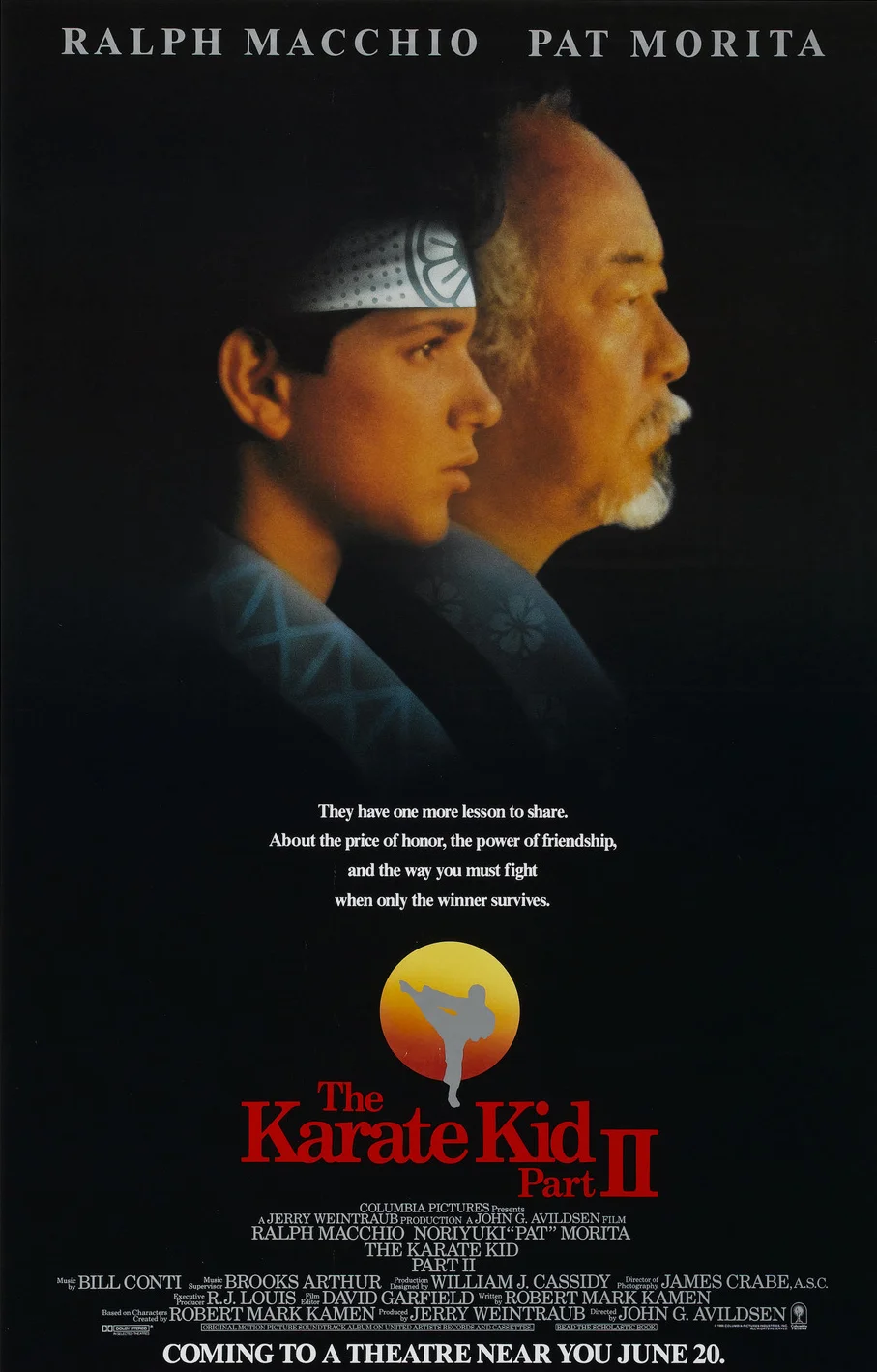
3/13:
What's good about The Karate Kid Part II is the rich cinematography which is visually well-shot.
And...that's about it. Now, for the negatives, there are several of them:
In the beginning, I see John Kreese, the sensei of Cobra Kai, going batshit crazy over some stupid,
silly, and meaningless tournament, and his reaction is too cartoonish to believe.
Later, there's this guy who has a decades-long feud with Miyagi which is about "honor." Forgive me, but I'm
always bored whenever I hear that word. It's what killed the film. If a boy messed up at the age of 17 by doing
drugs, is that a stain on honor even though it might be the only bad incident in his life? What if he goes on
to do great things later? And who's going to remember whatever the stupid things he did twenty or thirty
years ago? Time does heal wounds.
Finally, there's a Japanese, an Okiwanan if you will, female who develops a relationship with Danielle. It's
almost like an American invading the country and poisoning her mind. Then, Danielle proceeds to insult her by
asking if she had been *clear throat* arranged. Hence, it's hard to take the plot seriously. By the way, what's
interesting is that Miyagi is never seen interacting with his fellow villagers.
Meanwhile, I look at Chozen and his body, and I look at Danielle and her body. The experience level between
the two cannot be ignored, yet Chozen loses the big fight. Hm, right. I suppose the next film will theoretically
pit Danielle against Bruce Lee in a steel cage match with the former emerging as the victor.
All in all, the rubbish shown in The Karate Kid Part II has my head spinning around like Regan MacNeil in
The Exorcist.
The Karate Kid Part III (1989)
Rate:
2
Viewed:
4/13
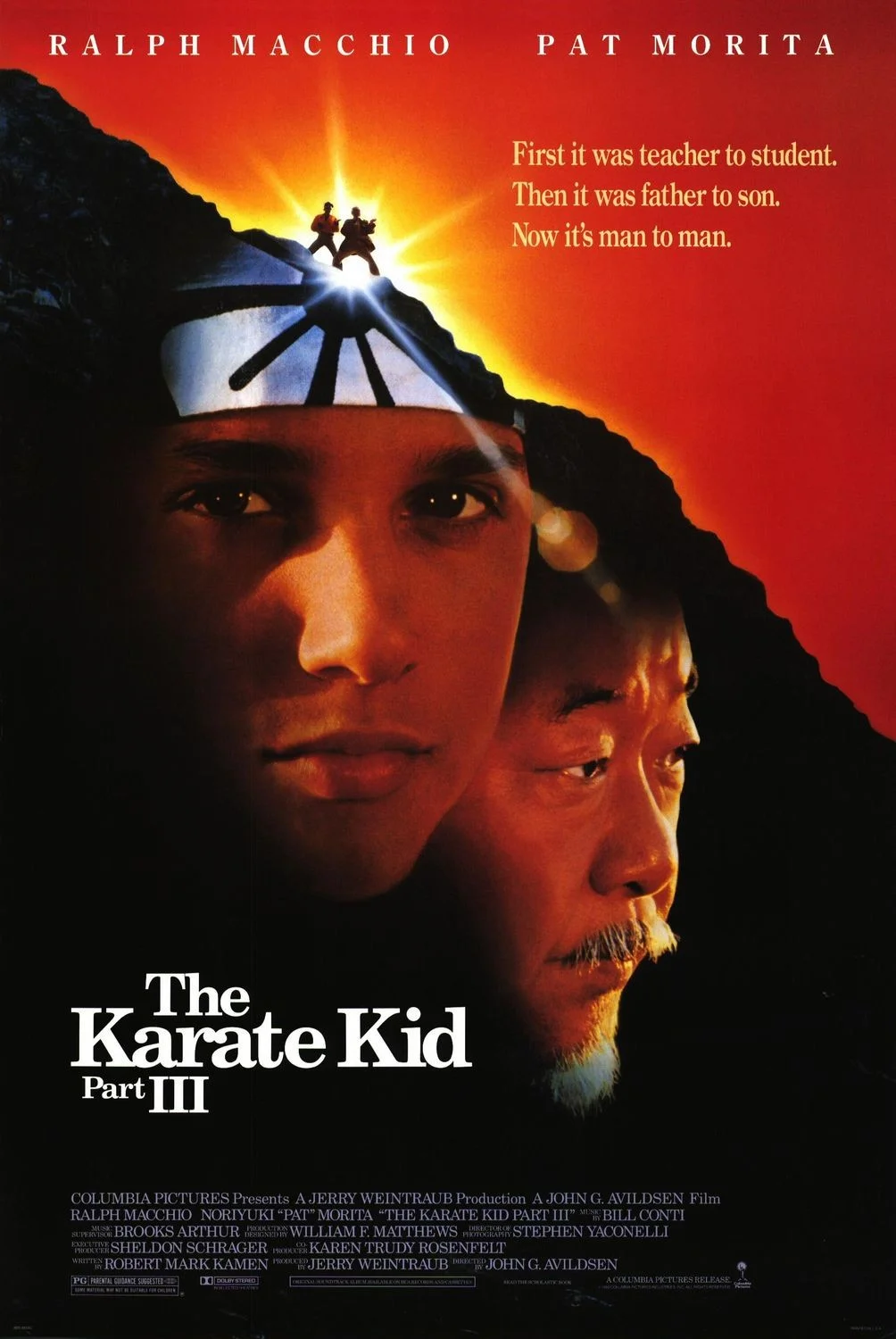
4/13:
Being significantly worse than the last two films, The Karate Kid Part III finally exposes Danielle for
who she is: an arrogant pissant who can't be satisfied with what she has.
After everything Mr. Miyagi had done for her, she proceeds to insult him by leveling verbal abuse, effecting
the ruin of any shred of likeability. Danielle's constant "crack is wack" talk is grating to listen along with
her junkie behavior. "The possibilities are endless?" What the fuck are you talking about, Danielle? And who
the fuck buys bonsai trees for $10,000? Only in Japan. By the way, Ralph Macchio looks chubby and has sandbags
under his eyes which is a sure sign of crack habit.
On the other hand, I like Thomas Ian Griffith who's charismatic as Terry Silver. His antics are funny and
amusing. Come to think of it, Terry has been humiliated by Danielle and her teacher; so, what will he have
done next? He should've killed them, preferably with his bare hands. If not, it's about time that somebody
has tried guns.
By the way, the idea of Danielle getting a free pass, reaching the finals of the All-Valley tournament, is
über idiocy. She's clearly outmatched and outclassed against Mike Barnes. Yet it only takes one simple
point for Danielle to win the match. In fact, if you look at the board, you can see she's declared the winner
before the tournament has begun. Ironically, it's an "Under 18 All-Valley Tournament," but everybody knows
anyone under 18 who graduated from high school is ineligible to participate. No wonder why Danielle only
competes in this particular tournament which has made-up rules, allowing her to win, even by the flimsiest
technicality.
Three straight times, Danielle picks up a girl, uses her, and then bedjumps for another while making up
a harebrained excuse how the last love interest didn't work out. Why bother casting Robin Lively if her
character had already been taken?
All in all, Ralph Macchio needs to put down the goddamn crack pipe for good.
Kelly's Heroes (1970)
Rate:
5
Viewed:
10/05
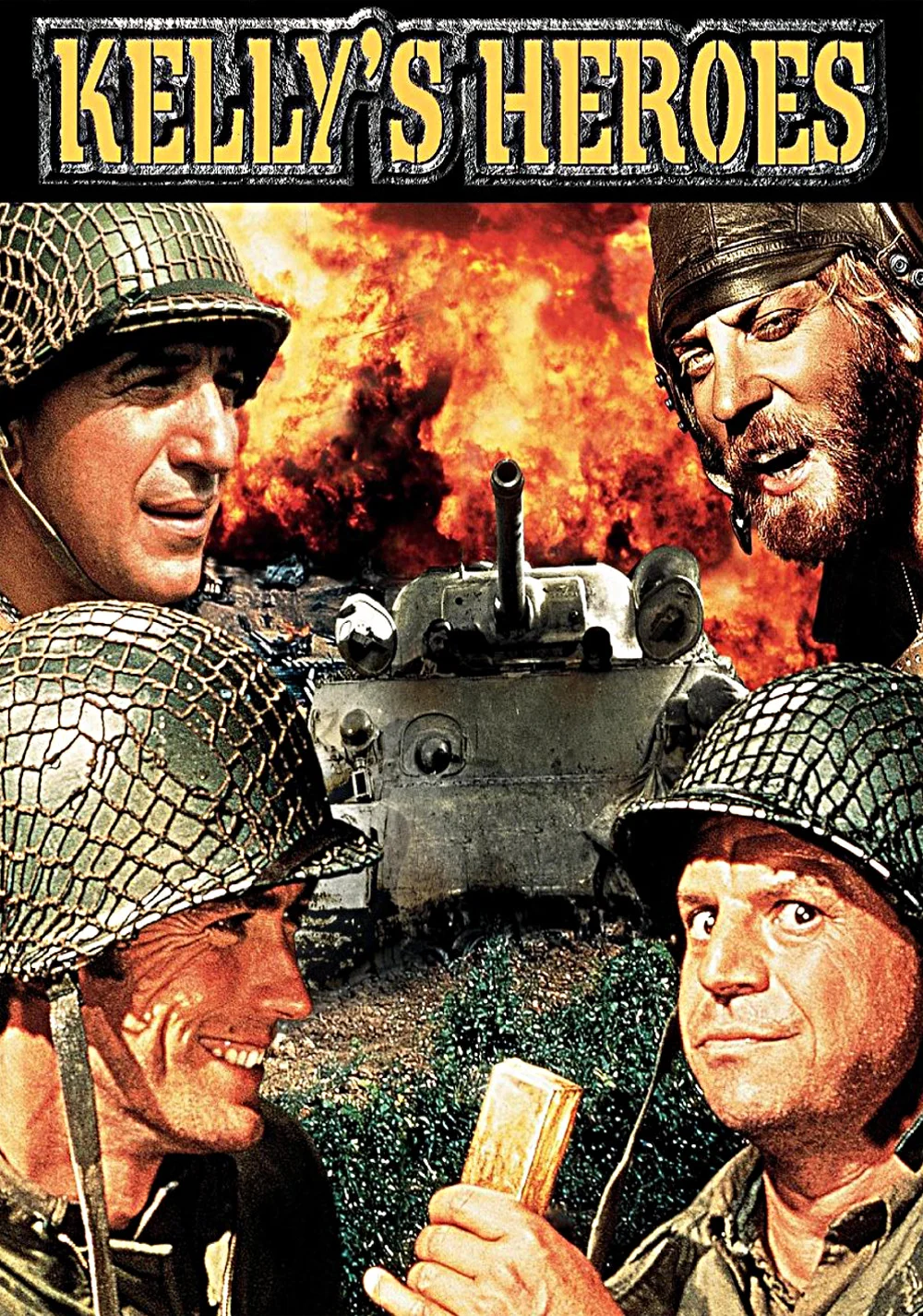
10/05:
Kelly's Heroes is a fair war film in the vein of The Dirty Dozen.
If not for Donald Sutherland, it'll probably fall flat in most aspects. His character Oddball may look like an
anachronism, but whatever works works.
Donald Sutherland has a great presence, and his best moment is when he looked at the bridge through his binoculars and said,
"Still up," while giving a thumb up as the plane came in to blow up the bridge, causing him to conclude, "No, it ain't."
Additionally, he has winning 60's lines for a WWII picture such as:
"Why don't you knock it off with them negative waves? Why don't you dig how beautiful it is out here? Why don't you say
something righteous and hopeful for a change?"
"Definitely an antisocial type. Woof, woof, woof! That's my other dog imitation."
"Always with the negative waves, Moriarty, always with the negative waves."
The rest of the cast is all wrong. The officers and some of the soldiers look like caricatures from a vaudeville show.
Interesting is the premise, but it doesn't work for me. The biggest malady is Don Rickles who does an atrocious job.
Historically speaking, is it possible that the gold was extracted from victims of the Holocaust? Then, I can't be
rooting for anyone, right?
All in all, it's Donald Sutherland who steals the show in Kelly's Heroes what's otherwise a mediocre WWII picture.
The Kentuckian (1955)
Rate:
9
Viewed:
12/20
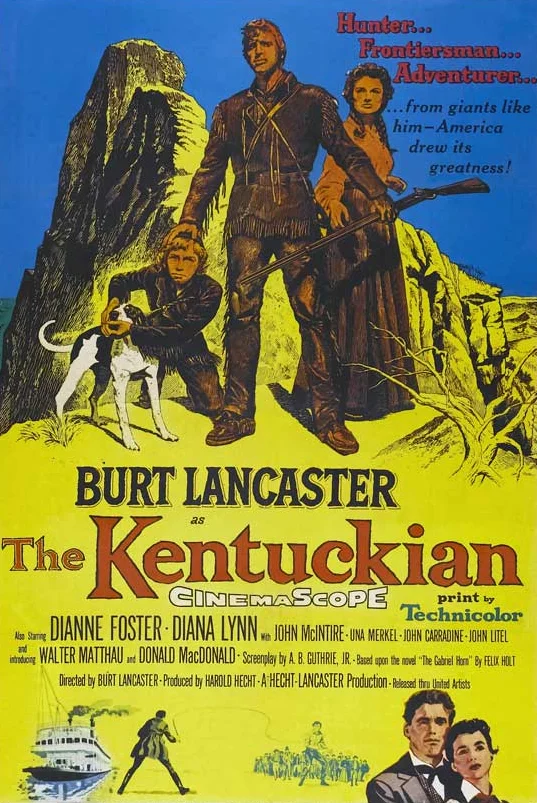
12/20:
If you love Burt Lancaster's films, you're in a treat for The Kentuckian, the only fully directed picture
of his career.
It's been a long time since I heard something that's wholesome, clean, and rich. The Technicolor cinematography
is beautiful. This one is complemented by a strong cast with the mean Walter Matthau in his feature film debut,
realistic-looking woodsman costumes, and a wonderful storyline that's full of adventure with its share of ups
and downs. Mostly, the film has something to say about people and virtues.
The most impressive of all is the sight of Burt Lancaster running across the pond to get his man before he reloads
his flintlock gun. Maybe with the exception of Sylvester Stallone, nobody could've done something
like that at full speed and still make it dramatic.
All in all, unfairly criticized back then, The Kentuckian holds up well today, and I wish Burt Lancaster
kept directing more pictures.
The Kentucky Fried Movie (1977)
Rate:
2
Viewed:
6/25

6/25:
No wonder why I have John Landis in my Worst Directors list.
Solidifying his disreputation is The Kentucky Fried Movie. For some reason, I never got around
to seeing this film until now, and I think it was made unavailable for so long on purpose. Thus, I can see why
given Jim Abrahams, David Zucker, and Jerry Zucker had done better stuff later.
Sure, there is an amusing skit here and there like the usher standing behind a viewer to provide special effects
and the death commercial hosted by Henry Gibson (he ended up doing something similar called
The 'Burbs a decade later). But just about everything has been boring and
unfunny. Obviously, the filmmakers are obsessed with sex, porn, and big breasts.
The worst goes to the very, very long remake of Enter the Dragon
which clocked at 32 minutes. In comparison, the "A.M. Today" skit lasted six minutes which is good for second
place. What's the point of that if it's not going to be funny? If I want kung fu action, I'll rewatch the original
with Bruce Lee. Surprisingly, the "spoof" doesn't contain the Mirrors scene.
All in all, The Kentucky Fried Movie is embarrassing.
Key Largo (1948)
Rate:
8
Viewed:
12/05, 11/13, 11/21
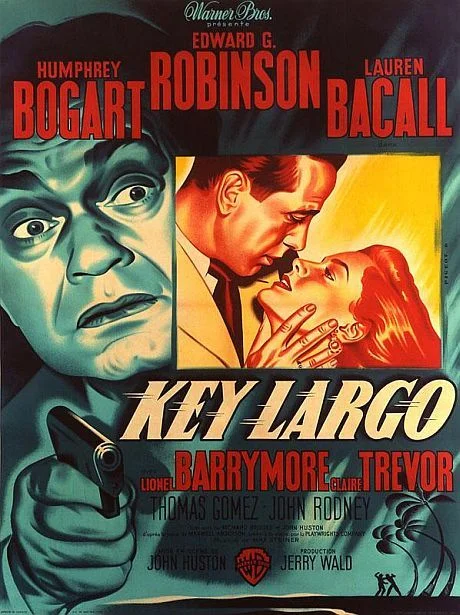
12/05:
Key Largo is a static talky picture.
I had high hopes because of the strong cast and director John Huston, but it's a big letdown. The characters are
stuck in a hotel and forced to wait out the tropical storm nearly the whole time.
Humphrey Bogart and Edward G. Robinson do what they can, but it's not enough. Lauren Bacall isn't much of an actress.
Lionel Barrymore is useless. Claire Trevor won the Best Supporting Actress Oscar just for one scene.
All in all, Key Largo is never interesting enough to pass the time.
11/13:
My opinion still hasn't changed.
Key Largo remains a dull, static picture because it takes place inside the hotel most of the time, waiting for the
tropical storm to pass over, and all everybody can do is talk.
As much of star power as Humphrey Bogart and Edward G. Robinson bring to the film, it isn't enough. However, each does
have a movie moment. The former has a classic reaction after learning about the murder of the Osceola brothers, and the
latter has a shaving scene which is at once fascinating and arresting to watch.
Claire Trevor's Oscar win as the drunk doxy is the most laughable aspect. Believe me, she's anything but. Lauren Bacall
apparently thinks that looks are enough to get by, but she still can't act. Lionel Barrymore,
who's stuck in the wheelchair and spews a litany of what he'll do to Johnny Rocco, is boring to listen to.
All in all, Key Largo is tedious.
11/21:
What an old movie Key Largo is, but the pairing of Humphrey Bogart and Edward G. Robinson is tremendous.
Of course, it's kind of like To Have and Have Not all over again. Clearly a play, the dialogue isn't
that bad, and because of the superior acting quality, I manage to get through it well. What's tough about sitting through
this ordeal is everybody is cooped up in the hotel until the storm clears. Oddly enough, the whole thing was mostly
shot on a soundstage with the rest in the backlot or water tank instead of the Florida Keys.
Claire Trevor may have won the Oscar for Best Supporting Actress, but I don't see anything noteworthy although I understand
the sad scene of terrible singing clinched it for her. As a curmudgeon, Lionel Barrymore has played the same thing over
and over in many films. Lauren Bacall is beautiful but isn't much of an actress. Therefore, the true stars of the show
are Humphrey Bogart and Edward G. Robinson. The shaving scene with the latter is brilliant.
All in all, Key Largo is a solid film noir picture that's made possible by superior acting from the leading stars.
The Keys of the Kingdom (1944)
Rate:
5
Viewed:
1/25

1/25:
I turned off The Keys of the Kingdom after thirty minutes.
That's because I can't stand too much talking. It's always been Joseph L. Mankiewicz's problem. The man
needs to know when to stop being in love with his words. A couple of days later, I went back to the film
when it transitioned to China. That's when the film started to improve only because...there's less
talking! As a result, I finished the whole thing in one sitting.
Unfortunately, the whole show is average, constantly reminding me of
Goodbye, Mr. Chips due to a peculiar storytelling trait. It
goes like this: the protagonist is seemingly a failure at first, but the more we get to know his deeds amidst
the passage of time in decades, the better person he actually is, hence his unofficial status of a saint.
Here's the trouble: where's the growth? I don't sense anything. Everybody looks the same, and nothing has
changed. At the end, the protagonist is given a beautiful send-off that's supposed to make me teary-eyed.
Such ridiculous stuff. I think it only works in epics such as
Lawrence of Arabia, Lean on Me,
and Braveheart. You need a larger-than-life character to effect this kind
of meaningful change, something that Gregory Peck and Robert Donat never possessed to begin with.
Anyway, it's a decent performance by Gregory Peck who makes his screen debut, coming from a run of failures
on Broadway. Afterwards, he was given an Academy Award nomination, setting off fifty-plus years of
excellence in cinema. However, for the same type of role, I recommend
The Scarlet and the Black because Gregory Peck became a
better actor over time by perfecting the art of magnanimousness.
Meanwhile, I give credit to Hollywood for not casting white thespians as Asians with the exception of Leonard
Strong who played Mr. Chia. I don't know how often this has happened in the early 40's and before, but it's
a rare achievement. The makeup job on Gregory Peck is excellent, putting whoever did Billy Crystal
and David Paymer for Mr. Saturday Night to shame.
All in all, The Keys of the Kingdom just needs the first thirty minutes cut out in order to get
on with the main presentation.
Khartoum (1966)
Rate:
4
Viewed:
6/14

6/14:
I chalk up Khartoum as one of those meaningless films about a part of British history.
Other than the interest of the Suez Canal, I fail to see the significance of British's role in the city of Khartoum.
Their claim is to protect the Egyptians, but what for?
For the most part, the film tries too hard to be the next Lawrence of Arabia. That's
why it's comparatively inferior. However, the battle scenes shown are impressive, sometimes amazing, and obviously, they were
made possible at the expense of horses' lives. I won't be surprised to learn if a great deal of them had died during the filming.
To reduce a point in my rating, there are many white actors who are blackfaced to portray Egyptians, Sudanese, and
whichever else their nationalities are supposed to be. They could've saved money by using real foreigners instead. The
ridiculous sight of Laurence Olivier as Muhammad Ahmed has my head shaking.
All in all, you're better off watching Lawrence of Arabia for the umpteenth time.
Kickboxer (1989)
Rate:
8
Viewed:
5/12, 1/20

5/12:
Kickboxer is Jean-Claude Van Damme's second film and, despite the excellent-looking poster, isn't
very good, acting or martial arts-wise.
Sure, there are nice moments, but they're few and far between. Rooting for Tong Po to beat Van Damme's
character, I consider him a better villain than Bolo Yeung in Bloodsport,
but he's largely wasted in the poorly choreographed final fight.
What happened at the end looks to me, for the majority of the time, Tong Po had beaten Kurt Sloane to a pulp.
But somehow, he dug deep to overcome his physically damaged body and managed to defeat his nemesis.
Meanwhile, there are many cheesy scenes, especially with Kurt's brother. The story is silly as hell, and these
guys are in Bangkok, the capital of Thailand. Stupid, crazy things happen there, and it isn't America where
common sense prevails. By the way, the heavyweight world championship belt looks fake; in fact, it's probably
a weightlifter's belt for all I know.
All in all, if you have to pick, go with Kickboxer over Bloodsport.
1/20:
Raising my rating from '4' to '8', I have to say Kickboxer is an excellent martial arts picture with an
imposing villain.
The Muscles from Brussels, Jean-Claude Van Damme was probably the best martial arts star of the 80's and the
early 90's. That much is obvious in Bloodsport, Kickboxer, and
Lionheart as he shows off his mastery of fighting skills and impressive
physique.
What I like about Kickboxer is the story, especially how Van Damme's character came from the United
States to Thailand, which is nice to look at, to witness the permanent paralysis of his brother, a kickboxing
world champion (Dennis Alexio), at the hands of Tong Po (Michel Qissi).
Then, it's the Muay Thai training that's the most fascinating part where Van Damme shows off his splits and
then dancing skills. Finally, the match between him and Tong Po is epic with both guys having their
hands hemp-roped and coated in resin before dipping into the broken glass even though the injuries inflicted
on each other will have to be fatal.
All in all, although I'll choose Kickboxer over Bloodsport, both are
definitive Jean-Claude Van Damme pictures.
The Kid (1921)
Rate:
3
Viewed:
11/07
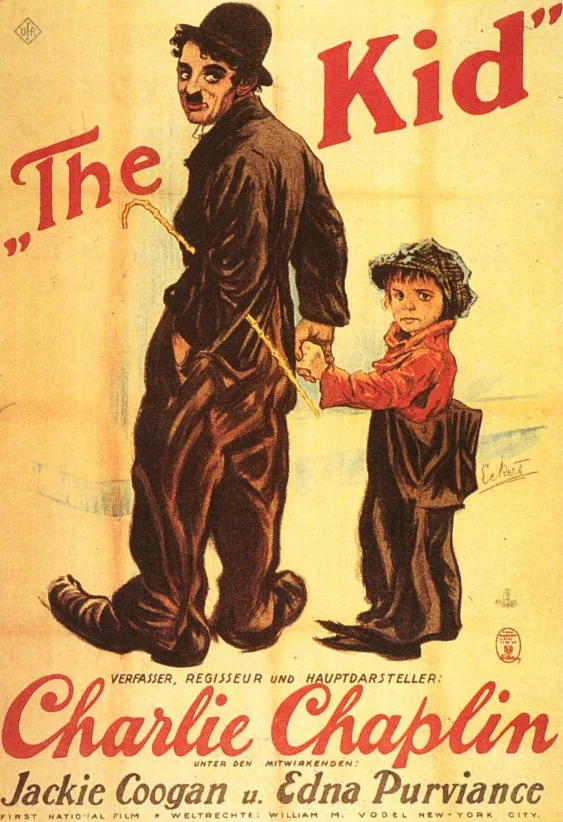
11/07:
After enduring fifty-six mindless Chaplin shorts, I feel there's a huge improvement in The Kid.
Compared to the churned-out garbage by Charlie Chaplin, the quality is now high with a modicum of creativity. Yet
there's nothing to be gaga about.
Quite frankly, I don't see how the dream sequence, near the end, has anything to do with the story. Also, the middle part drags
a lot. In an attempt to win me over in the long run, Chaplin is manipulative by using Jackie Coogan to draw sympathy, so his
film can finally be likeable.
All in all, The Kid isn't six reels of joy but anguish of suffering through Charlie Chaplin's sheer idiocy.
Kid Auto Races at Venice (1914)
Rate:
3
Viewed:
8/06
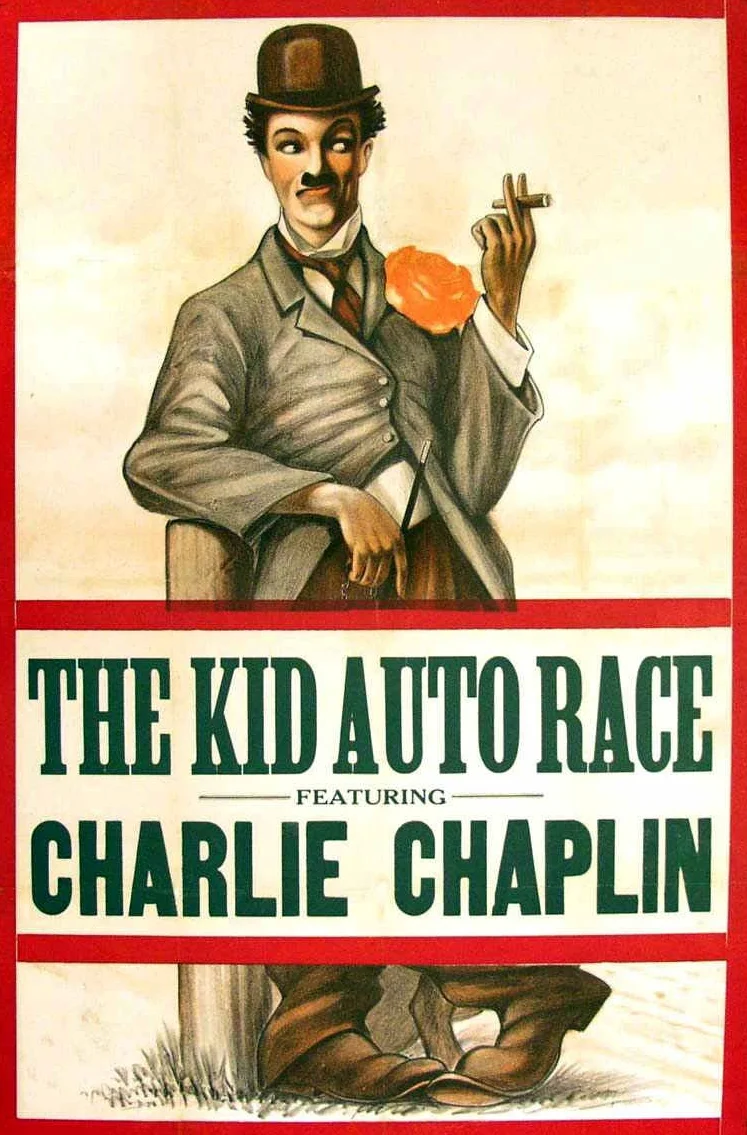
8/06:
All I see in Kid Auto Races at Venice is Charlie Chaplin acting like a goddamn jackass.
People really laughed at this movie? You must be fucking kidding me.
All in all, I rather throw Charlie Chaplin in a boiling vat.
Kids (1995)
Rate:
10
Viewed:
9/04, 10/08, 7/15
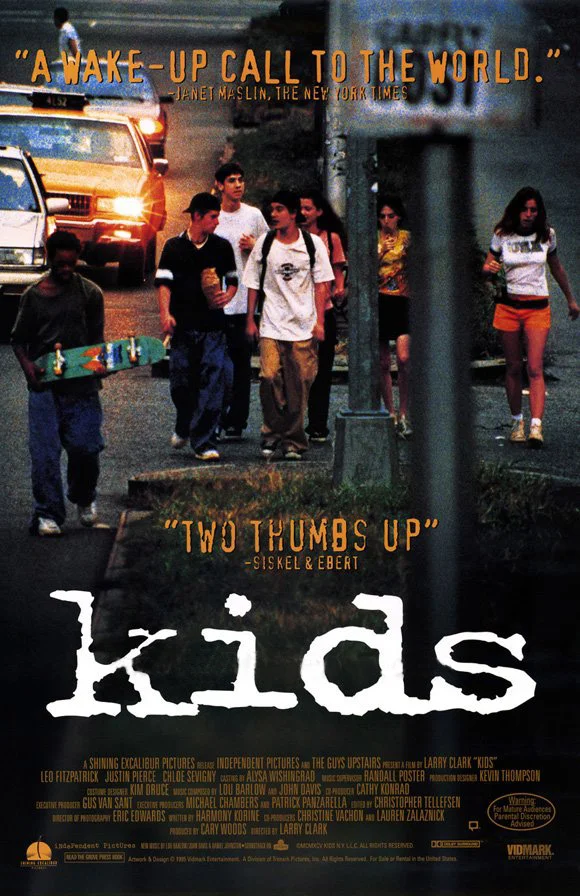
10/08:
Has it been so long since Kids was made?
The first time I saw the film, it was shocking, edgy, raw, and real. Gradually, after seeing it for the third
or fourth time, the novelty has worn off. Sometimes, it seems Kids was meant to glorify sex, drugs, and
alcohol among rebellious teenagers although there's a profound message at the end. However, I still don't think
it's effective enough to make a point, so it's hard to recommend the film unless you're looking for shock value.
There isn't a single likeable character or anybody to feel sorry for. All deserved what they got coming to them.
Regardless, the performances are outstanding and very authentic. My favorite is Leo Fitzpatrick who's brilliant
as the odious Telly.
Meanwhile, I would like to look back on how juvenile delinquent films had progressed over time. There was
Rebel Without a Cause and
Les quatre cents coups in the 50's that were more of products of
an innocent time. Then, there was Blackboard Jungle which made
juvenile delinquents look more hardened.
During the 70's, the shock value was ramped up in A Clockwork Orange
for all the wrong reasons. It was hard to forget the too-close-to-the-truth documentary:
Scared Straight! Then came a film in 1986 called
River's Edge which was so shocking and disturbing that it did happen for
real. One could almost make a case for Class of 1984 which foretold
accurately what urban schools would look like. Finally, it was Kids, pushing the envelope so far that
there had never been anything else like it although Boyz n the Hood was
effective.
Having mentioned all these films, in order to make a mark in the juvenile delinquency genre, it has to top
everything in terms of grittiness, shock value, and brutal naked truth. When the achievement has been made,
the film can be assured of a lasting impact for years to come.
All in all, Kids gives a stark insight into the rebellious, sexually active teenage world without holding
back anything, and it's all brilliantly done.
7/15:
The first time I saw Kids in 1995, I came away highly impressed.
It wasn't the AIDS angle that did it but how the whole thing looked. I thought the film was real and the kids
were actually doing it. This was made possible by hiring unknown, nonprofessional child actors because Larry
Clark opted for the Italian neorealism route. Fast forward twenty years later, my perception hasn't changed.
It's still a relevant picture. Of course, the situation depicted is extreme, but there's a point being made.
My favorite character is Telly, brilliantly played by Leo Fitzpatrick, who's both irresistible and disgusting.
He makes the role work. Casper, who looks all drugged out and is unable to think for himself, sticks close to him
because Telly makes things happen and Casper wants to be in the middle of the action.
I love how the characters come to a full circle, beginning with Telly infecting Jennie with AIDS and ending with
Casper getting the virus by raping her. Actually, it's not explicitly clear whether or not she has AIDS because
being tested positive for HIV isn't the same as being tested positive for AIDS. The ending is poignant when
Casper said, "Jesus Christ, what happened?" which sums up Kids the best. And to answer that, I don't
think it'll be hard to explain.
All in all, Kids is a rare gem because it's a honest film about the ephemeral payoff of sex.
Kill Bill: Volume 1 (2003)
Rate:
1
Viewed:
5/04, 7/06

7/06:
Quentin Tarantino used to be the hottest name during the 90's.
He was making incredible films that were avant-garde, redefining the word "hip." Then, his rep went down the toilet when he
did Kill Bill: Volume 1 and Kill Bill: Volume 2. Looking back, I realize now
Quentin Tarantino was more of a one-hit wonder than anything else although he did direct two very good films:
Reservoir Dogs and Pulp Fiction.
Watching Kill Bill: Volume 1, all I can say is: "What the fuck is this crap?" A clear insight into Quentin
Tarantino's infantile, immature mind, the film is so slow, boring, trite, pointless, and devoid of entertainment that I'm
incapable of analyzing it in depth.
All in all, only a mentally retarded director can make works of crap like Kill Bill: Volume 1.
Kill Bill: Volume 2 (2004)
Rate:
1
Viewed:
7/06
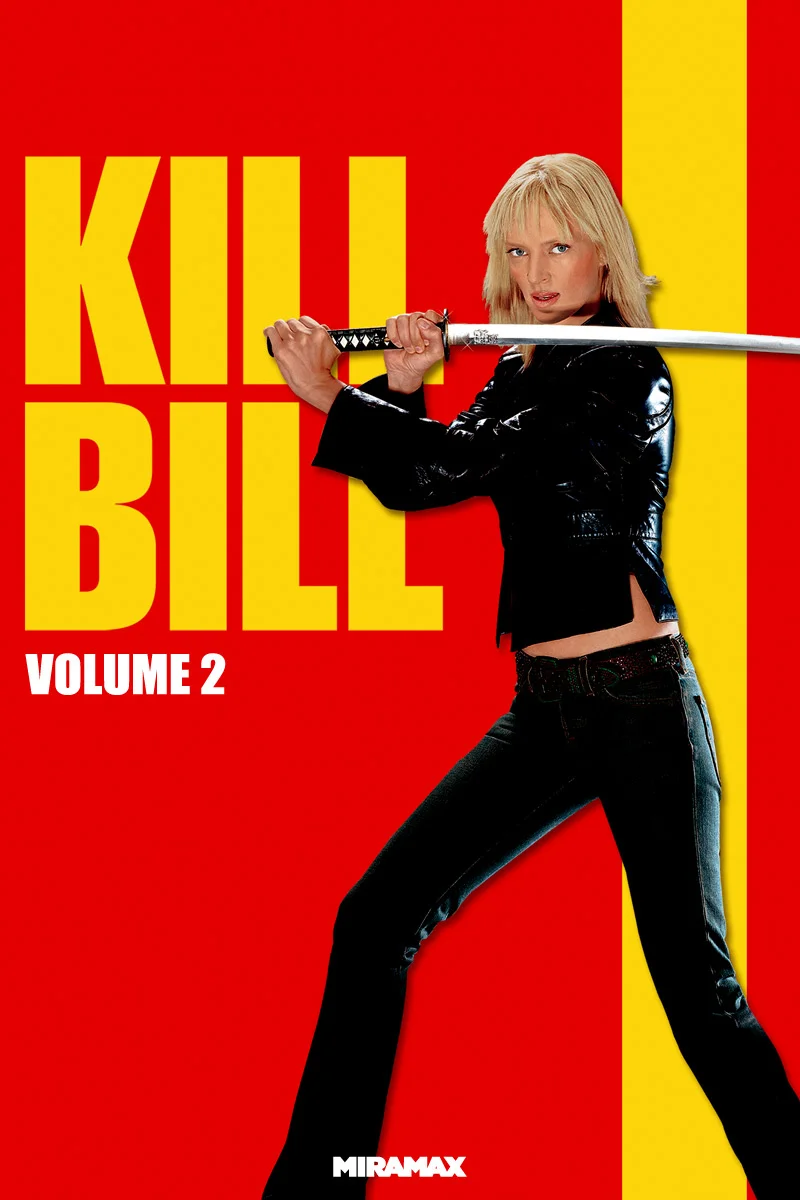
7/06:
Oh, joy to the world.
It's finally over. Kill Bill: Volume 2 is a fucking waste of my time. It's like watching
Phantasm
sequels and getting nowhere.
All in all, Kill Bill: Volume 2 is an "oh, my fucking God."
Kill Me Again (1989)
Rate:
7
Viewed:
10/14
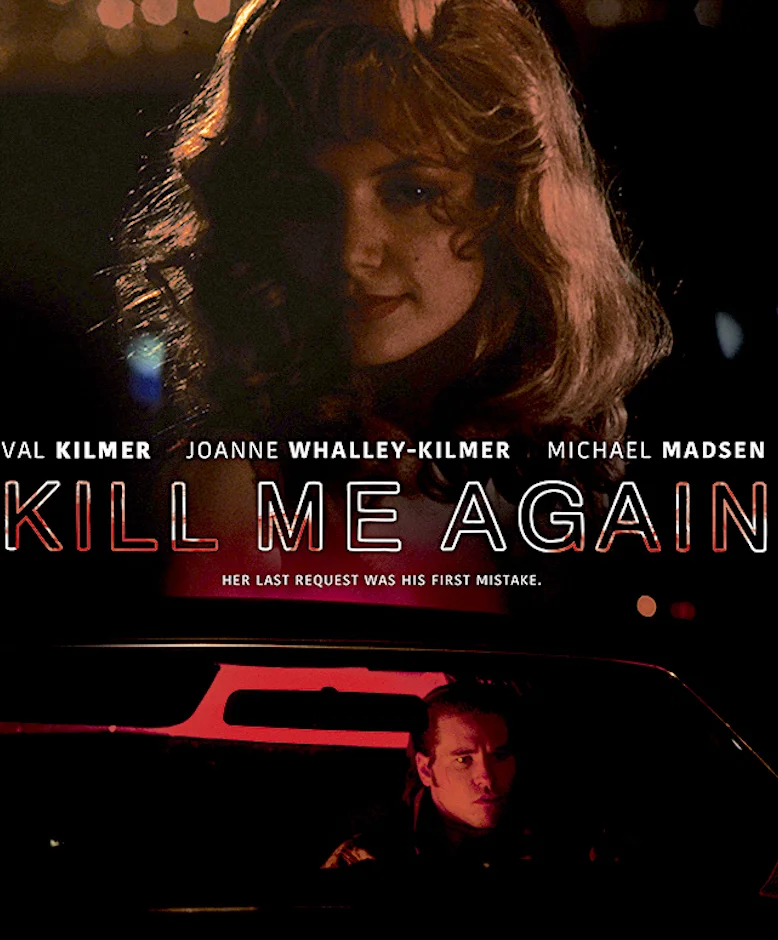
10/14:
Kill Me Again was a box-office failure that it remains an obscure title to this day.
Leafing through the DVDs by the spine, I could've easily missed this one, but, thanks to my ever-sharp eyes, I managed to
put in the effort to take it out and inspect the cover.
Starring in Kill Me Again with his then-wife (no surprise at the divorce), Val Kilmer was, once upon a time, an
accomplished actor until The Island of Dr. Moreau happened. It's a neo-noir
treat with plenty of fun double-crosses. I like the construction of the story and the locations used, especially in the desert.
However, Michael Madsen is such a downer because quite frankly, he plays the same character every damn time. His mannerisms are
repetitive; it's hard to believe Michael Madsen was able to find work consistently. To prepare for his role in
The Getaway, he probably thought of his performance for Kill Me Again and redid it.
All in all, Val Kilmer makes Kill Me Again, which marks John Dahl's directorial debut, worth watching.
The Killer Elite (1975)
Rate:
3
Viewed:
8/14

8/14:
I don't think I've seen a film in a while that's as terribly vague or prodigiously wasteful of big stars as
The Killer Elite.
In the beginning, Tom Hagen pops Sonny Corleone in his two prime joints. Thereafter, he's stuck in the hospital,
relearning how to be functional. After Sonny is better, he indirectly gets his man at the end. In between, there's
nothing but confusion.
I may notice Sam Peckinpah's attachment to the film as the director and can spot his trademarks. But the reality
is: he was already washed up as evidenced by
Bring Me the Head of Alfredo Garcia the year before. I
guess Sam Peckinpah didn't bother to follow his own 6 P's: Proper Planning Prevents Piss-Poor Performance.
All in all, The Killer Elite is a major avoid.
Killer Joe (2011)
Rate:
5
Viewed:
7/15
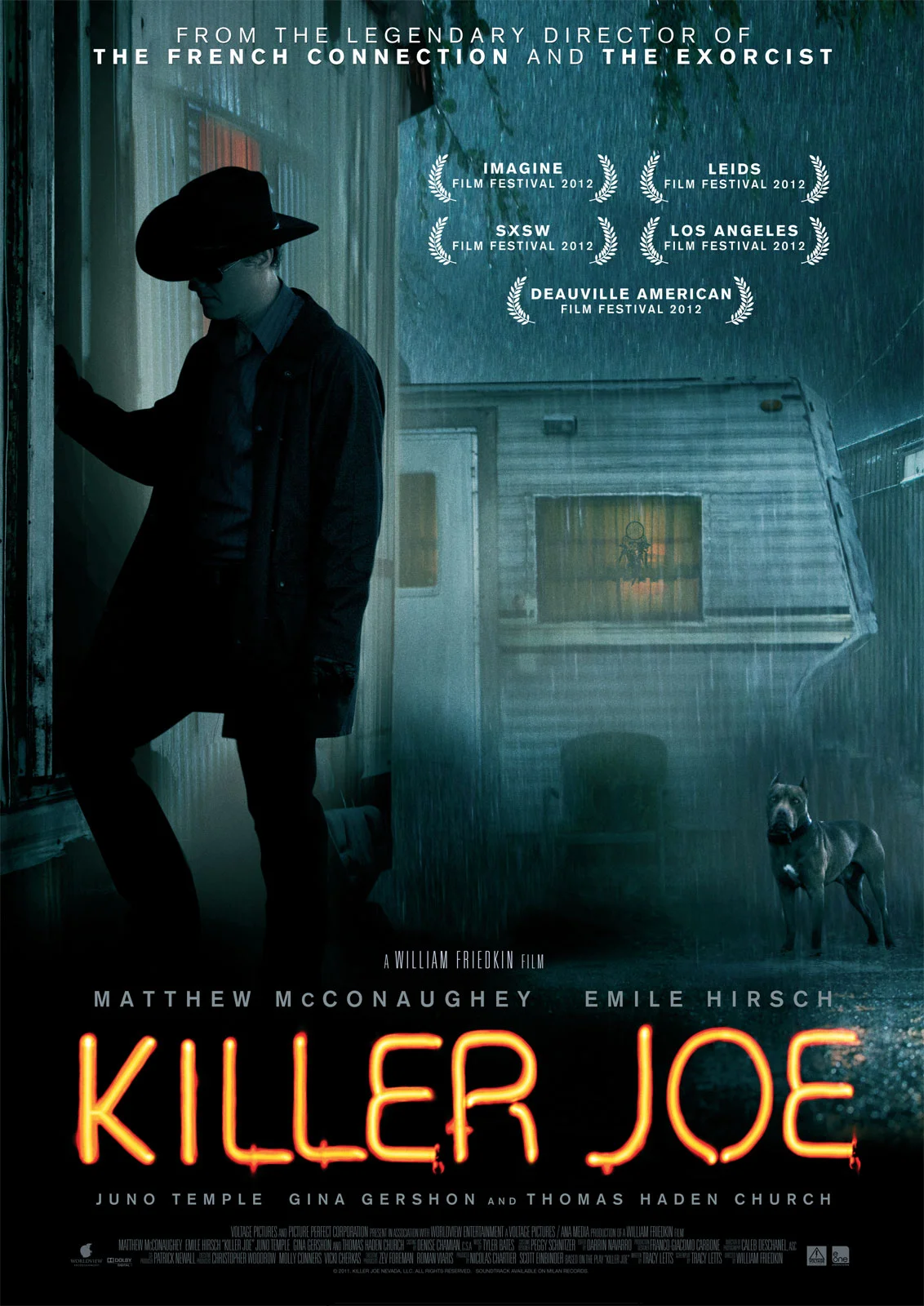
7/15:
It seems William Friedkin had sold himself out by giving the audience what they wanted because Killer Joe is a
cinematic low point in terms of female treatment.
The picture moves slow, covering several subplots that serve as self-indulgence (big time in Juno Temple's case),
and is extreme at moments for the sake of it.
The longer Joe Cooper is away from the police station, the more unbelievable his character becomes. Does he
ever work? How does he have a lot of time on his hands? Won't he be implicated in the crimes due to the high amount of time
he spends with the trailer trash family?
Matthew McConaughey isn't good this time because his character is dark, sleazy, and slightly over the top.
He's a better actor when he does light romance comedies or dramas about real life stories. That's why I didn't like his
work in Dallas Buyers Club.
Emile Hirsch, a Jack Black look-alike, is the only one of the cast who gives a decent performance. However, I have to laugh
at the staged fight; not a single punch or kick connected. Come on, William, you can do better than that. As for
everybody else, my head can only shake. By the way, some actresses have bared their unshaven vagina in various films, but in
Killer Joe, Gina Gershon decides to wear a "merkin" instead. So, what's the point if it amounts to the same thing?
And if she's going to fake it, why bother casting her?
All in all, the amount of degradation as shown in Killer Joe, especially the fried chicken drumstick scene, is the
reason why I mostly avoid movies made after the year of 2000.
Killer Party (1986)
Rate:
3
Viewed:
12/16, 4/22

12/16:
Filmed in 1984 but released two years later, Killer Party has one of the
strangest openings ever when it tangentially begins with a rock music video featuring White Sister.
Eventually, it gets back on track and becomes average all the way to the end. The ending is dumb and cheap.
They should've cut out the demon stuff and tried to be normal for once. Maybe it'll be a better movie this way.
Killer Party was billed as a "horror comedy" movie. Horror? Very little. Comedy? No, not really. Anyway, the
story is stupid, and I don't care about these people of fraternities and sororities. Just kill them all. Who cares?
Meanwhile, one of the lead actresses resembles Elisabeth Shue, and a couple of the actors look like the boys from
Porky's, but it's not them.
All in all, the pace of Killer Party is lively, but the horror aspect needs to be emphasized more.
4/22:
Killer Party is one of the worst horror films from 1986.
Horror isn't even the right word as the story is about nothing. Neither is "comedy" as there are no laughs to
generate from. It's like the filmmakers had a random idea for a scene and kept going while piecing them together
to create an incoherent movie. A good example of what I mean is the first four scenes in the beginning: the wake,
the drive-in, the rock music video, and the sorority which are all done in the span of ten minutes.
The first hour is very distinct from the final twenty minutes, and they have nothing to do with each other.
Hence, everybody ran out of time and had to wrap up the nonsense quickly. That being said, there's no explanation
to why the Elisabeth Shue look-alike turned into a demon. It's just a long stream of randomness which includes gross
or moronic fraternity/sorority hazing practices and pranks with some of the worst thespians they have to offer.
All in all, forget Killer Party; instead, check out April Fool's Day.
The Killer That Stalked New York (1950)
Rate:
8
Viewed:
3/24

3/24:
The Killer That Stalked New York is 70% medical drama and 30% noir with shades of
The Naked City.
There are two connected stories going on at the same time: the smallpox epidemic and the woman's search for her husband who skipped out
on her with the diamonds. The film title may be misleading in the noir sense but is correct when it comes to the
word "that" instead of "who" because it's exactly what the authorities are looking for.
At first, I thought it was the girl who started the smallpox, but it turned out to be the other way. Then, I thought it was
a typhoid because there's no such thing as smallpox anymore which was declared completely eradicated in 1980, thanks
to vaccination. But yes, it's an infamous infectious disease that was responsible for the death of 500 million people worldwide
in the final 100 years of its existence.
The acting is good but is overshadowed by what's going on. I like how the mayor did his job quickly with zero
financial consideration or whatever else. The film is based on what happened in 1947 when an outbreak occurred in New York
City, and over six million were vaccinated during one month. As a result, only two people died. Patient Zero first contracted it
on vacation in Mexico City before returning to New York City. Willard Parker Hospital, as shown in the film, was the
epicenter.
All in all, film noir or not, The Killer That Stalked New York is captivating because of the subject matter.
Killer: A Journal of Murder (1995)
Rate:
7
Viewed:
7/04, 10/20
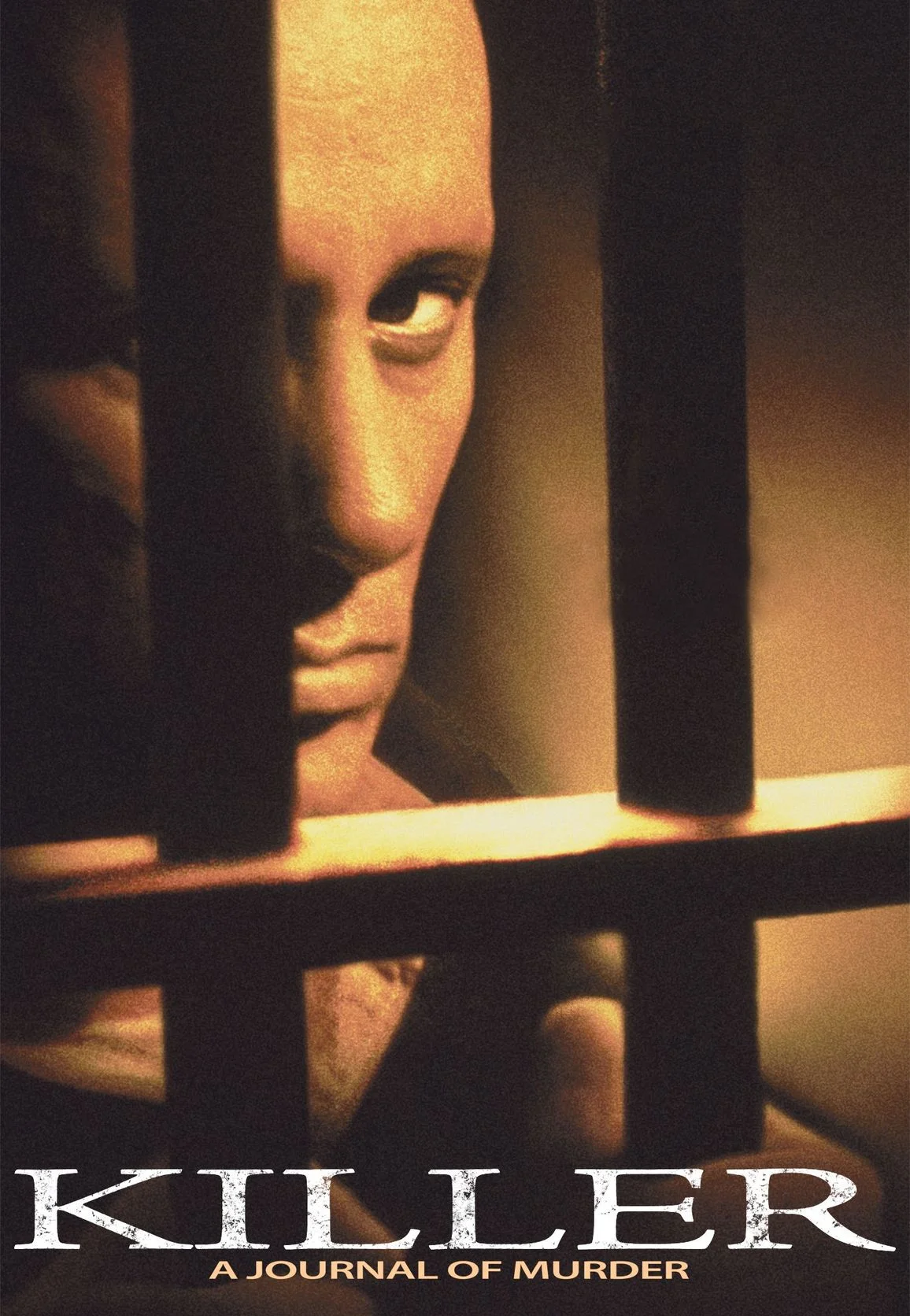
10/20:
Killer: A Journal of Murder is an interesting but mostly ordinary, pointless biopic about a notorious
convict named Carl Panzram.
I picked up this movie solely for James Woods because of the strong exclamations from various critics that he
gave a "powerful, searing performance" and that it was a "galvanizing Oscar-caliber portrayal." Um, okay, if
they say so.
Well, I didn't see what everybody was saying, even three times when the movie was first released, then in 2004,
and now. James Woods gives his usual best, but he was more brilliant in
The Onion Field,
Salvador, Best Seller,
The Boost, Citizen Cohn, and
Indictment: The McMartin Trial, among others. All of them
are more Oscar-worthy than what James Woods did in Killer: A Journal of Murder.
Instead, Robert Sean Leonard gives a strong performance. It's probably the best of his career despite
not thinking much of him as an actor. What works the best is Robert Sean Leonard's projection of innocence.
Therefore, it's easy to believe the idealistic side of his character, hence the message of the film which is
silly but typical of liberals. Then again, he blew away a rare coin to buy drinks for the undeserving barflies,
giving the film an unsatisfying ending until it was rescued by the narrator to summarize what his act of
kindness for Panzram had been about.
All in all, Killer: A Journal of Murder makes for an easy watch, but the actual life story of Carl
Panzram is a lot more detailed and adventurous than what's shown in the film.
The Killers (1946)
Rate:
9
Viewed:
4/07, 5/11, 12/24
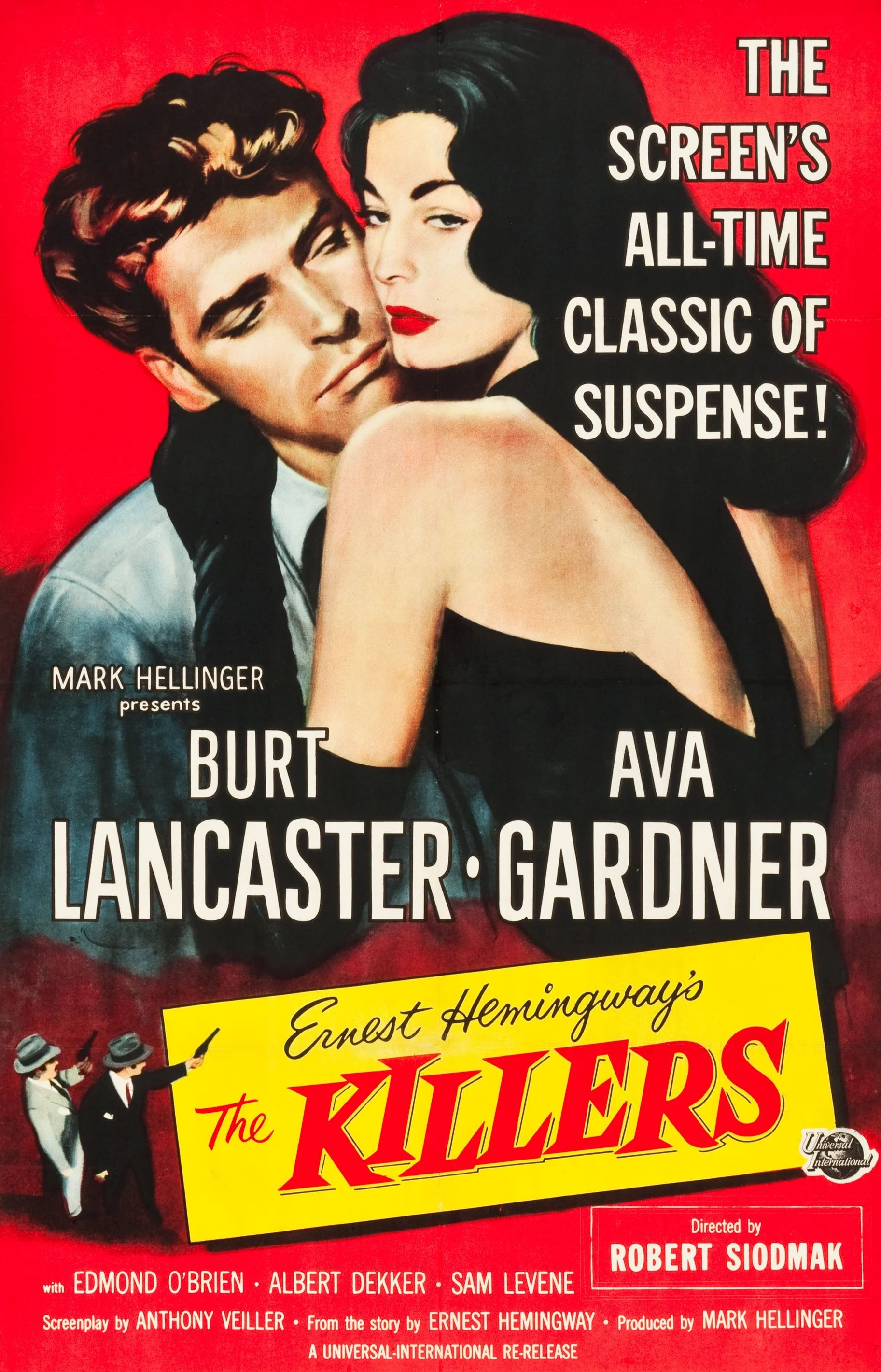
4/07:
The Killers is a tough, gritty, and stylized film noir with wonderful performances.
Ava Gardner is the femme fatale. Although the story can be initially confusing, it gets better over time.
The Killers is also the type of film that needs to be watched again and again to get it fully.
All in all, The Killers is a terrific film noir.
5/11:
Somewhat slowed by the pace, The Killers is a decent film noir.
It features Burt Lancaster's screen debut; although talented, he looks unrefined.
Ava Gardner, who'll be a sex symbol afterwards, looks uninspiring when compared to the bombshells of her heyday.
However, the use of her as a femme fatale works well, making The Killers a compelling film.
All in all, The Killers is an excellent example of the film noir genre, but I wish the pace was a
bit quicker.
12/24:
The Killers is better this time.
Burt Lancaster and Ava Gardner make their names and will be unforgettable in subsequent films, but the strongest
performance comes from Edmond O'Brien. The narration style is reminiscent of
Citizen Kane. Hence, it's a compelling movie this way. It helps a great deal
when two tough guys are cast: William Conrad and Jack Lambert.
The story is simple. An ex-boxer agreed to participate in a heist. He thought Kitty Collins was in love with him,
but she never was. Whatever ideas he had in his head, she wanted nothing to do with them, so she used him this way
for the other guy: Jim Colfax. As a result, everybody paid the ultimate price.
All in all, when you look up a list of great films noirs, The Killers will be there.
The Killers (1964)
Rate:
7
Viewed:
3/09, 6/11
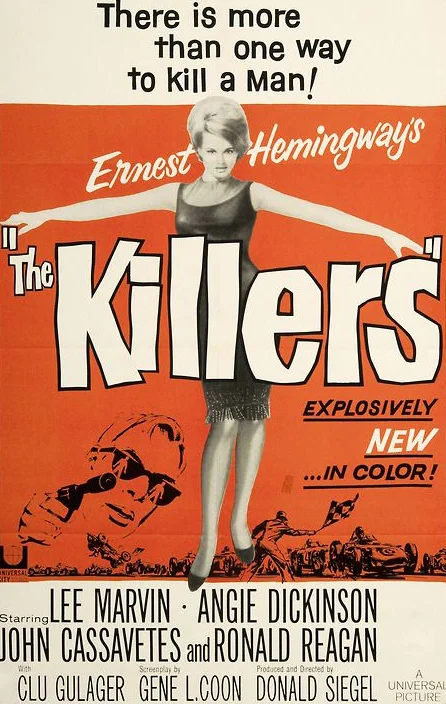
3/09:
I like the 1946 version of The Killers, and after seeing the remake, there are parts
that are worthwhile but not the whole movie.
To force me to stay interested, I've been fed by Lee Marvin, Angie Dickinson, and the story.
She reminds me of Ellen Barkin and gives probably the best performance of anyone. But Lee Marvin is terrific, too,
and should've gone solo with more screen time.
That being said, Clu Gulager is annoying, but it's too late by the time his character is assassinated. When Lee Marvin
attempted to throw Angie out of the window, he should've done that to his partner instead. At least, Lee Marvin makes
the best out of it and has a classic death scene.
Miscast for the role and just a plain terrible actor overall, Ronald Reagan is wooden. It's thankfully the last
acting performance of his career. John Cassavetes is also unconvincing as Johnny North. Both have caused the film
to fall apart. If Don Siegel wanted to strike gold, he should've gotten Steve McQueen instead of John Cassavetes. True,
he would've taken attention away from Lee Marvin and Angie Dickinson, but these two did hold their own, enough to
create a possible balanced triumvirate.
The remake has vibrant colors, letting the cinematography do the job. Moreover, the story is good and makes sense
although it took me a while to put two and two together. There's a certain aerial shot that looks like a rip-off from the
opening scene of Nicholas Ray's They Live by Night.
All in all, The Killers pales in comparison to the 1946 original but can be a lot better with the right cast.
6/11:
Okay, I've decided The Killers is a decent remake.
The colors are great, and, more importantly, Lee Marvin's presence is what makes the film fun. It's too bad
he's granted little screen time to flex his stuff. The annoying sidekick of his should've died much sooner.
As babe as she gets, Angie Dickinson plays the femme fatale better than Ava Gardner.
Meanwhile, I still can't get over looking at Ronald "Help! Help! My Face Is Paralyzed" Reagan. How that joker got into
Hollywood is something I'll never understand. At any rate, the story is compelling enough to watch the film,
and I love the ending. Of course, all great actors must have a classic death scene, and Lee Marvin has his own in a big way.
One negative I must point out in regard to the plan occurs in the middle when the mail truck took a detour. I was
thinking, "Why not have two sets of people: one for the traffic and cleanup while the other, consisting of John Cassavetes'
and Ronald Reagan's characters, sits in the car while waiting for the truck instead of wasting time doing all of the
unnecessary work?" Anyway, there's a clear rip-off of the aerial scene from
They Live by Night that was directed by Nicholas Ray.
All in all, the remake of The Killers works well.
Killer's Kiss (1955)
Rate:
7
Viewed:
5/11, 4/22
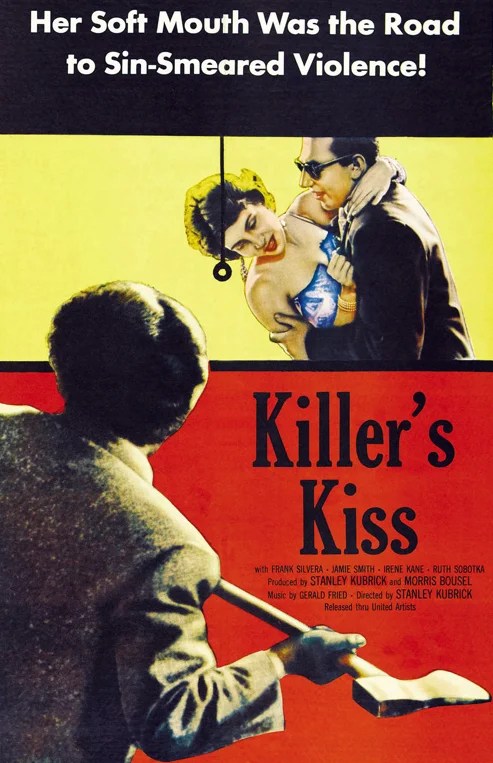
5/11:
Despite clocking at 67 minutes, Killer's Kiss feels lengthy.
Stanley Kubrick takes too much time by focusing on the aesthetic details while forgetting about the plot. He
throws all kinds of film noir elements on the wall, but not much sticks. As a result, Killer's Kiss
comes off as somewhat tacky. The premise is harebrained, and there are also leaps in logic. In the movie poster,
nobody resembles the actual thespians.
Before the major fight, Davey Gordon reads a note that he probably has done ten times already. By the time he
gets to the arena, he doesn't make an effort to be serious about the match. Then, he loses the fight in an
embarrassing way. If I were Davey, I would hide in shame for a long period of time, but he takes it well as if
nothing has happened. Worse, his face looks perfect: no bruises or swelling.
Of course, Davey decides to get together with the woman who happens to have a window next to his, and he falls
in love with her in two days. All of that is done without a trace of chemistry. Perhaps Davey may be suffering
from bleeding around the brain region? Either that, or he's mentally incompetent to begin with. The
ending is silly after she confessed to wanting to be with the other guy. Maybe they're stupid and therefore
deserve each other.
All in all, Killer's Kiss, although made for an impressive sum of $75,000, is a good stepping stone for
Stanley Kubrick.
4/22:
The style is there for Killer's Kiss, but it's a bit hokey movie.
Not much happens for a long time; therefore, Stanley Kubrick mostly focuses on cinematography, especially
the exteriors, which is great and not so clinical.
Jamie Smith tries but is no Burt Lancaster. At least, he gets things moving by staying with the noir tone.
Irene Kane, or rather Chris Chase, is way worse, and her character is just a two-bit blonde tramp. I wasn't
rooting for them to be together at the end. Newcomer Stanley Kubrick wasn't originally thinking of this but
received a deal that he couldn't refuse: $100,000 budget for the next film:
The Killing.
All in all, Killer's Kiss is an above-average film noir, and talent is evident in Stanley Kubrick.
The Killing (1956)
Rate:
10
Viewed:
9/13
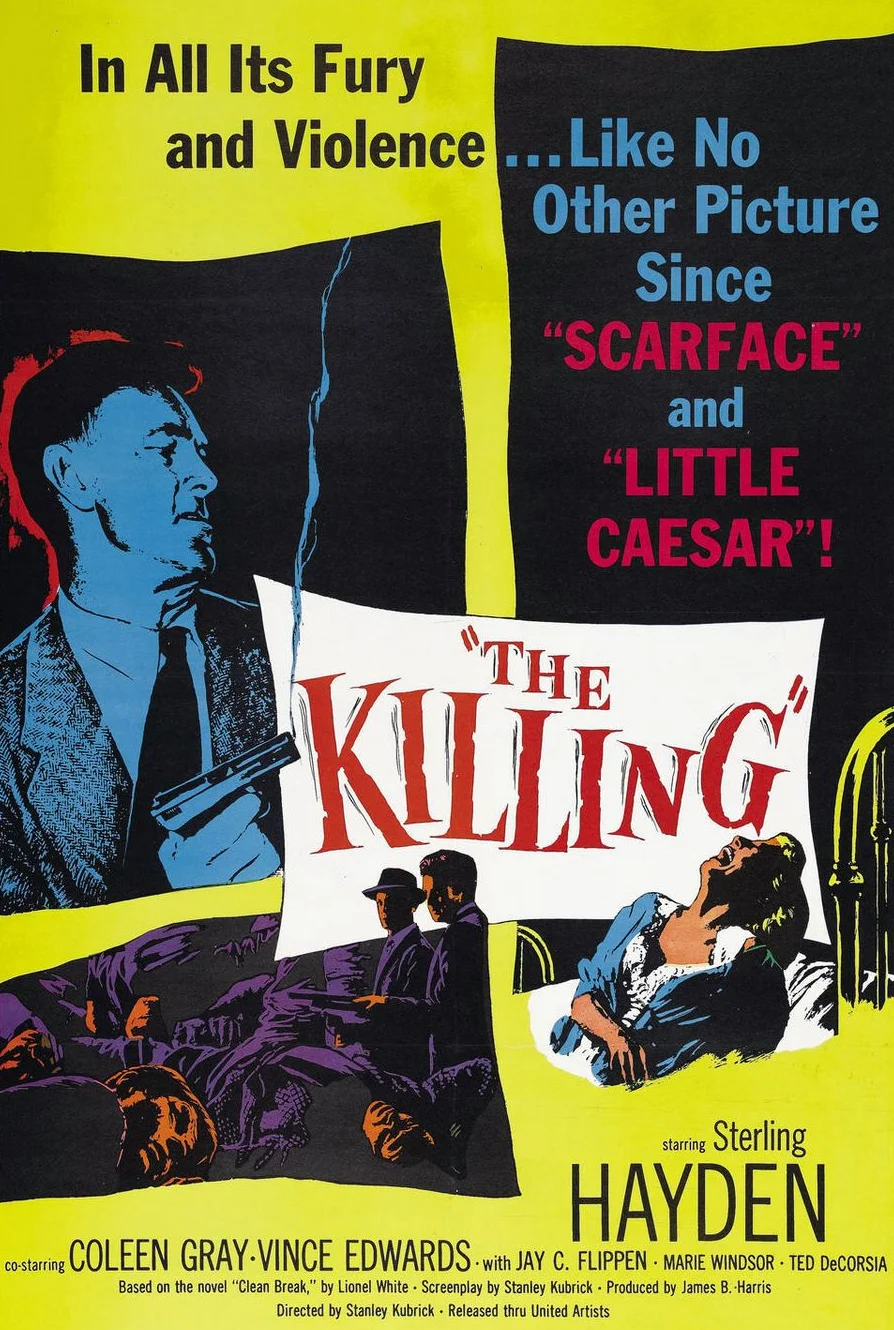
9/13:
After directing a hokey picture called Killer's Kiss, Stanley Kubrick decided to
improve his film noir technique more for The Killing.
The results are better this time around. It's sharper, fresher, and less corny than
Killer's Kiss.
Led by Sterling Hayden, the cast is wonderful through the unfolding of a drama that's akin to John Huston's film noir
masterpiece The Asphalt Jungle.
One nice thing is that every character has a fatal flaw. It makes them all real; hence, they're relatable. To finish
the film off, the ending is a sad sight.
All in all, The Killing is a fantastic noir piece.
The Killing Fields (1984)
Rate:
10
Viewed:
12/13, 2/22

12/13:
There's no denying the fact that The Killing Fields is a powerful motion picture.
However, there's a deduction of one point for the lack of historical background about what happened in Cambodia during
the 70's. I have to know it beforehand. As the years pass, more people like me are increasingly unaware of such events, hence
the need for the films to serve as a reminder. That's why there are some moments here that are either confusing or unclear.
On the other hand, the acting is top-notch. It's Roland Joffé's direction that makes the film work.
Compared to The Mission with Robert De Niro and Jeremy Irons, there's a big difference in
the execution as The Killing Fields is more emotionally feeling.
All in all, The Killing Fields will have to be viewed again later.
2/22:
The Killing Fields is the gold standard of wartime reporting pictures.
The other I can think of that comes close to this level of excellence is Salvador by Oliver
Stone. They are both 1a and 1b. This is what it takes to go out in the war zone and document what's going on. John Malkovich
taking pictures is a brilliant example of this.
During the Vietnam War, Cambodia was designated as a neutral country which meant it was supposed to be left alone. But the
United States ignored it by bombing the hell out of Cambodia. As a result, the Khmer Rouge emerged, with the support of the
Chinese Communist Party, and went on to slaughter approximately 25% of Cambodia's population because they, the
intelligentsia and anyone associated with the former government, were viewed as scapegoats. In 1979, Vietnam invaded
Cambodia and quickly destroyed most of the Khmer Rouge. All of it is former U.S. President Richard Nixon's fault,
and he was a true mass murderer.
Dith Pran, the subject of the film, was the first to coin the term "killing field" to describe the Cambodian genocide. When
the capital fell in 1975 as shown in the film, it was Phnom Penh. Sydney Schanberg received the Pulitzer Prize for
his wartime reporting in Cambodia.
A first-time nonprofessional actor, Dr. Haing S. Ngor lived through the experience and remains the only Asian to win the
Oscar for Best Supporting Actor. He went through three terms of prison and survived by eating beetles, termites,
and scorpions. In 1996, while in the parking garage, Ngor was murdered by an Asian gang who wanted his valuables, but he
refused to give up the locket that contained the picture of his deceased wife.
Chris Menges won the Oscar for Best Cinematography. He received another two years later for
The Mission. Sam Waterston was Oscar-nominated, but John Malkovich wasn't although he did
get it for Places in the Heart during the same year. The presence of Haing S. Ngor
certainly makes The Killing Fields more real. Here's what Julian Sands said about being cast:
"Roland's audition process was extraordinary. I was 24, and I've never come across anything as rigorous since. He was looking
to put together a troupe of actors without much film experience because he wanted the freshness of everything to resonate
with us. He would gather lots of us in his office to improvise scenes. After about a month, he had a group he found
interesting. John Malkovich, Sam Waterston, and Haing S. Ngor weren't subject to that, but their meetings with him were
still pretty intense. A lot was made of the fact that Haing hadn't acted before, but John put it differently: he said
Haing had been acting his whole life...you had to be a pretty good actor to survive the Khmer Rouge."
All in all, The Killing Fields is a powerful film of what it's like to be in a war zone.
The Killing of Sister George (1968)
Rate:
8
Viewed:
6/25
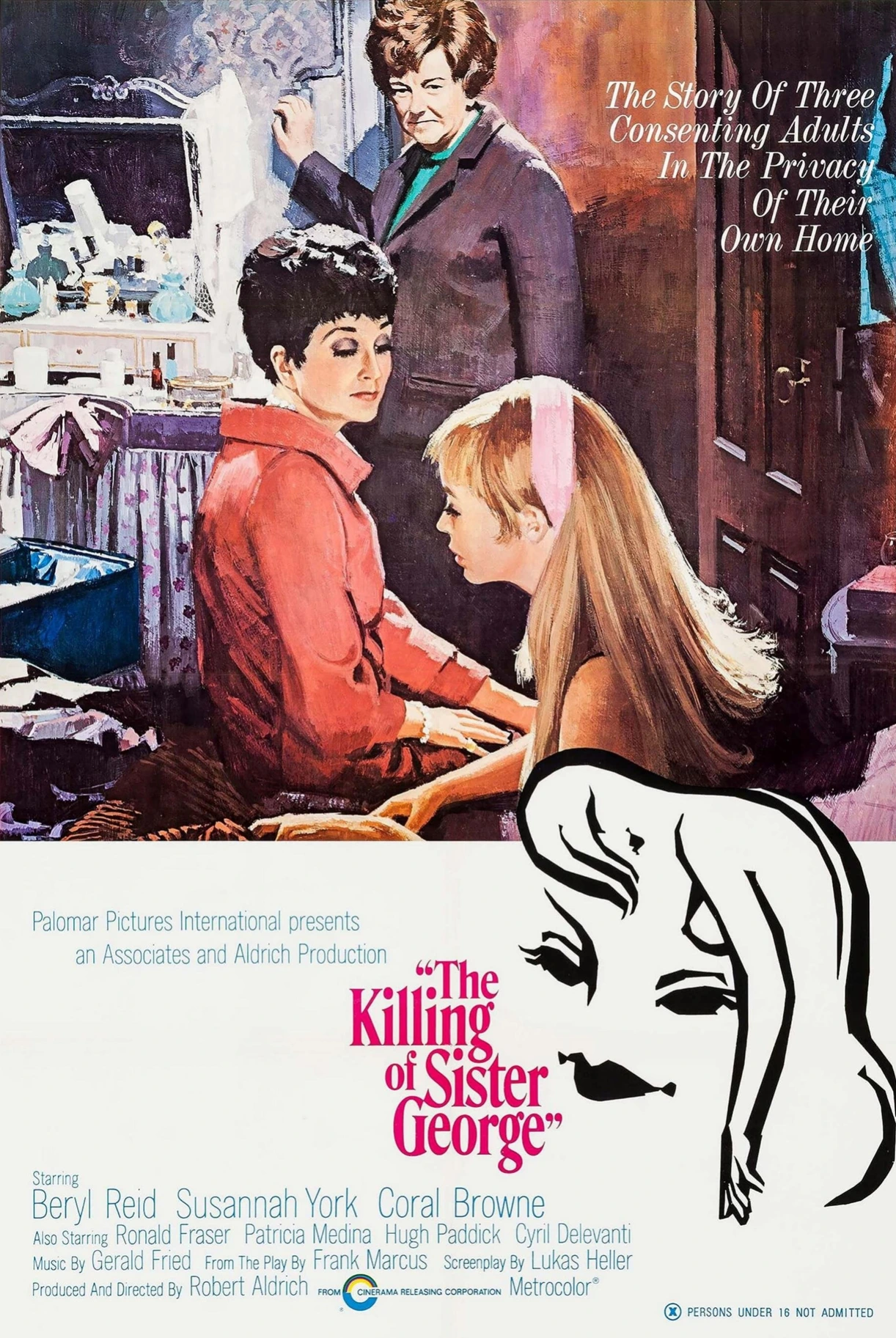
6/25:
Despite being totally forgotten, The Killing of Sister George has a reputation.
I was curious about it and, afterwards, can see why. What a total surprise that Beryl Reid, Susannah York (who's
way, way better than Julie Christie), and Coral Browne weren't Oscar-nominated. That has to be the best
performance of their careers. Is it because of the controversial content? For 1968, the lesbianism must have
been shocking to see on screen.
I've struggled about whether to give the movie a '7' or an '8' before settling on the latter because of two
reasons. The writing is 85% fresh and 15% old. It's either hard to understand or windy at times. The other is
the running length. Two hours and twenty minutes is too much, especially when putting up with the odious
Sister George. At least thirty minutes should be cut out.
When it comes to celebrities, especially those are behind the scenes,
The Killing of Sister George is quite accurate based on the tell-all books and unauthorized biographies
I've read. They can be mean, petty, vindictive, abusive, and extremely weird. It would've been unthinkable in
1968 because of how they came across in public and movies, but everything changed when the book
Mommie Dearest came out in 1978, exposing the real Joan Crawford.
All in all, Robert Aldrich scores another winner in The Killing of Sister George that's much better
than What Ever Happened to Baby Jane?
Killing Them Softly (2012)
Rate:
3
Viewed:
11/25
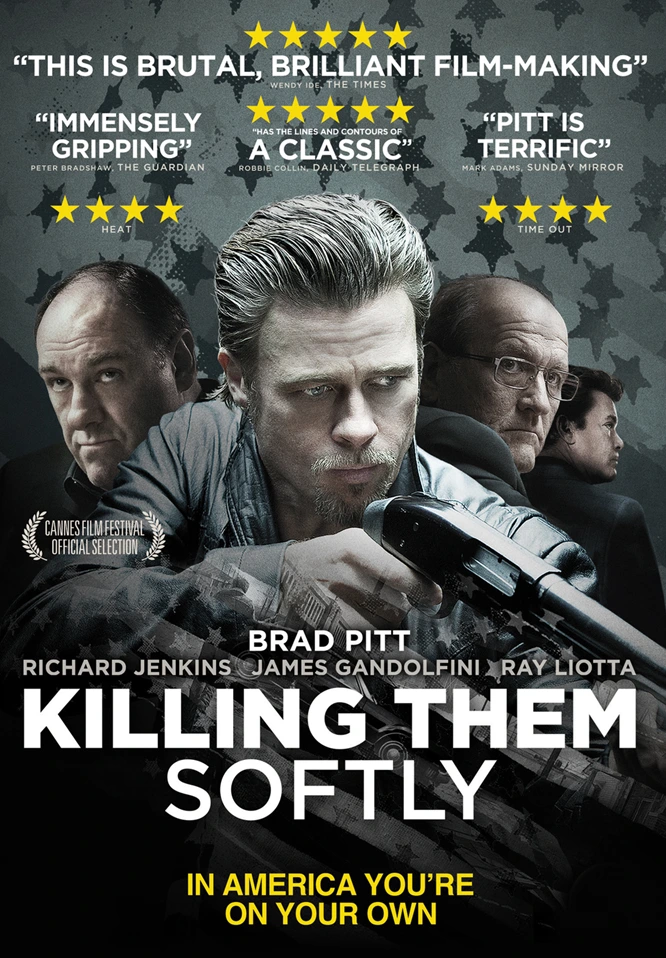
11/25:
Instead of "them," it's been Killing Me Softly.
Obviously, this is a Tarantino wannabe. There are boring scenes of guys trying to sound cool.
Their favorite word is "fuck" or some variation of it which turns out to be 171 in all. How about Dillon?
I never knew who that was until looking up the cast afterwards; it's Sam Shepard. Gee, he appeared for
like a minute, making zero impression on me.
The background babble of politics is another annoyance. Who cares?!? I didn't follow it back
then and doubted any street-level criminal was interested as well. At the end, the director tries to
make the connection by having Brad Pitt's character give the following weird speech:
"Don't make me laugh. We're one people. It's a myth created by Thomas Jefferson. My friend, Jefferson's an
American saint because he wrote the words, 'All men are created equal.' Words he didn't believe, since he
allowed his children to live in slavery. He was a rich snob who was sick of paying taxes to the Brits. He wrote
some lovely words and aroused the rabble. They went and died for those words while he sat and drank his wine
and fucked his slave girl. This guy wants to tell me we're living in a community. Don't make me laugh. I'm
living in America, and in America, you're on your own. America's not a country. It's just a business. Now
fucking pay me."
In many ways, the film resembles The Friends of Eddie Coyle.
How do I know this for sure? George V. Higgins wrote both books. There's no conflict this time.
Two guys and a mastermind rob a bunch of criminals during a poker game, and they are subsequently killed.
Where's the suspense in that? While at it, somebody should've figured out there's an Australian with a weird
accent and narrowed down the number of guys due to familiarity on top of seeing their faces plain and clear.
At least, Brad Pitt is the headliner. He plays his character well, and I don't have any issue
with him. It's been a waste of his talent, that's all. James Gandolfini and Ray Liotta look unwell; the
former would die prematurely the following year while the latter did in ten years' time. Meanwhile, I wasn't
sure if the film took place in South Philadelphia, but they filmed the whole thing in New Orleans as a
stand-in for Boston.
All in all, Killing Me Softly is an overwritten improv workshop that happens to star Brad Pitt.
A Kind of Loving (1962)
Rate:
6
Viewed:
4/25

4/25:
A Kind of Loving?
I don't think so. It's more of A Kind of Trap. I've never been a fan of Alan Bates, but he's not bad
here, trying his best to make something out of nothing in a slow, static picture. Making her screen debut,
June Ritchie is average and has no acting chops which explains why her movie career didn't last long. Thora
Hird steals the show as the domineering mother-in-law.
Because of the themes to punctuate the British New Wave, I prefer
Room at the Top and
Saturday Night and Sunday Morning.
The messages come across through them more effectively. Sure, it has nudity, marriage for convenience's sake,
miscarriage, and ideas of divorce, but I was rather bored by them all. No matter what, Denys
Coops' black-and-white cinematography of Northwest England is stunning.
Ingrid was trouble from the start. When she brought her friend along for the date, that should've told Vic
plenty. He's only enamored of Ingrid because of her blond hair. Then again, he would read a book about how to
have sex. To marry her is to marry her mother, and predictably, it turns into an institution. I hated when his
relatives told him to suck it up and live with the consequences. My answer is: divorce the bitch and move on; who
needs it? Of course, they want him to be miserable as well. I would've strangled her mother in no time.
All in all, I laughed at the end of A Kind of Loving when it said, "All characters and events in
this film are fictitious and any similarity to actual persons living or dead is purely coincidental";
talk about the biggest irony of the century when it comes to the British.
Kindergarten Cop (1990)
Rate:
9
Viewed:
2/24
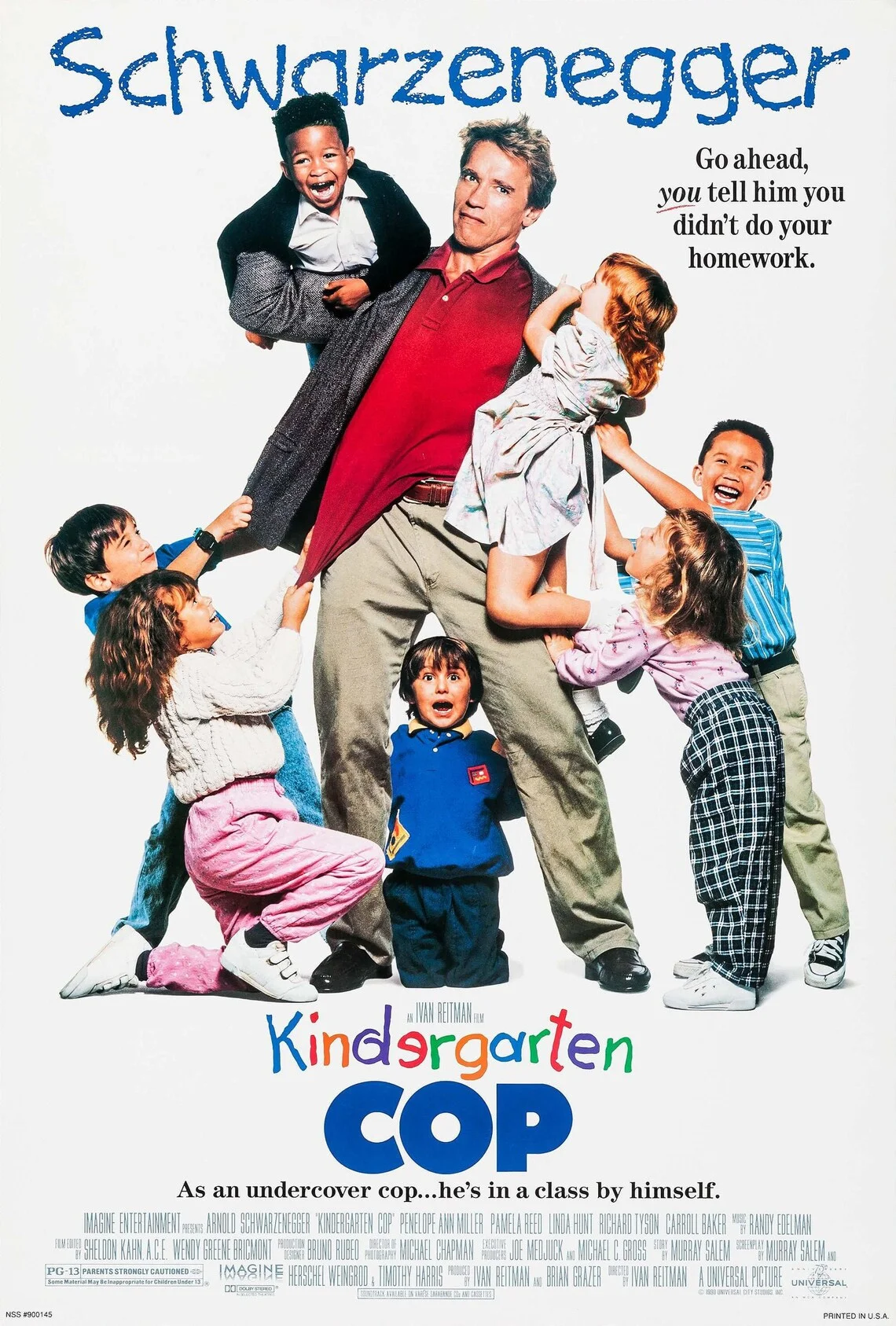
2/24:
Kindergarten Cop is one of Arnold Schwarzenegger's best films.
It was a smash hit in 1990-91. Everything still holds up well. The story is strong while the action is
never mindless. There's a reason why John Kimble had to go to Astoria, Oregon, and be an undercover teacher.
The supporting cast is impressive: Pamela Reed, Penelope Ann Miller, Richard Tyson of
Two Moon Junction fame, Carroll Baker, Linda Hunt, and Christian
and Joseph Cousins as Dominic.
The rest of the kids are all right but merely serve as background fodder. One nice thing about Linda Hunt as
the principal is that oftentimes people in her position can be meddlesome in the worst way possible and thus
ruin the film, but it never happens with her. Hence, Kindergarten Cop goes through rather easily.
Arnold Schwarzenegger is the right choice given his massive physique but still has a hard time with little kids.
As a result, he made a successful transition from action-adventure to comedy which began with
Twins. Arnold Schwarzenegger has nice moments when he's teaching discipline.
There are no scenes that are stupid or gross-out; they're typical of what a kindergartner will do or say. The
only question which went unanswered at the end is: will John Kimble go back to being a cop or make the switch
to teaching kindergarten?
All in all, Kindergarten Cop is an impressive film that's a mix of action, comedy, children, and Arnold
Schwarzenegger.
King (1978)
Rate:
9
Viewed:
7/21

7/21:
One of the strangest things I've noticed in regard to Martin Luther King, Jr., is everybody knows who he was,
but most don't have any idea of what he did specifically or the events he was involved with.
A Nielsen ratings disaster compared to Roots (13.8 versus 44.9), King
does an outstanding job of summarizing his accomplishments in a five-hour biopic. On top of it is the exceptional
performance by Paul Winfield which is the be-all and end-all when it comes to anyone wanting to play Martin
Luther King, Jr. His recitation of King's speeches is stirring.
However, one problem I have with the movie is the complete lack of mention about King's infidelities although it
did reveal he was a smoker which was something almost nobody knew. By now, it's a well-known fact that he had
numerous affairs and cheated on his wife regularly.
Another is King's meeting with Malcolm X at some hotel in Chicago. It's unlikely they came together to have a
talk behind the scenes because of their completely different philosophies that's much like the rivalry between
W.E.B. Du Bois and Booker T. Washington. They only met once while waiting for a press
conference in Washington, D.C., on March 26, 1964.
At least, King sets the story straight on a few things. JFK and RFK were never true supporters of what
Martin Luther King, Jr., was doing as they, being the politicians as they were, often thought about courting
white southern voters for the upcoming presidential election. They also authorized J. Edgar Hoover to wiretap
him. Hence, it was LBJ who finally got the Civil Rights Act passed. The whole story as presented in
Mississippi Burning is pure fiction; the FBI didn't care about
what was happening down there.
There's a famous picture of Jesse Jackson with Martin Luther King, Jr., on the balcony at the Lorraine Motel,
but it was taken on April 3, 1968. He wasn't exactly there when King was assassinated on the 5th but rather ran
away and hid behind an above-ground swimming pool. Shortly later, Jackson went to the balcony to soak his shirt
with some of King's blood and falsely claimed afterwards in public that he died in his hands.
The truth is King didn't get along with Jesse Jackson, who entered the picture late two years prior, and
mistrusted him from the start. The latter attended a theological school but was failing so badly that he dropped
out after six months. Then, Jackson adopted the title of "Reverend" without ever earning it. Since then, he has
made his living by shaking down corporations through race-based threats ("greenmail") with the help of
a violent Chicago street gang called Blackstone Rangers.
One nice thing about King is the sight of young faces. The cast includes Ernie Hudson, Howard E. Rollins,
Jr., Steven Hill, and Al Freeman, Jr. All of four King's children appear, and one of them is Yolanda who plays
Rosa Parks. Cicely Tyson may be a decent choice for King's wife, but she comes off as weak and is heavily doused
in light black makeup which is distracting.
All in all, thanks to Paul Winfield's performance, King is a remarkable achievement by going to the core
of Martin Luther King, Jr.'s message.
King Creole (1958)
Rate:
4
Viewed:
6/12
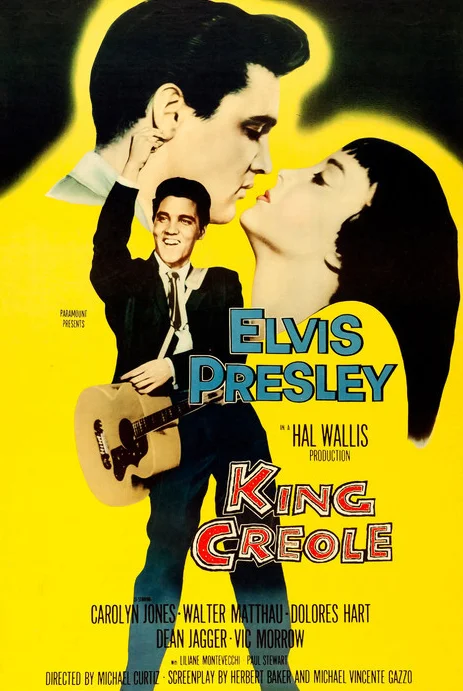
6/12:
In King Creole, the 23-year-old Elvis Presley plays a high school dropout, falls for a woman who's three times his
age, is wanted by a desperate lunatic girl, finds his life in danger in the hands of Walter Matthau, and is saved by a
half-wit mute.
You know, I like Walt, but he's better in comedies. This silly picture has too many musical numbers with the same old story.
Elvis Presley's face looks puffier than it was in Jailhouse Rock. His acting was a lot
better before, being a fan of James Dean and Marlon Brando, but in King Creole, he's inflexible and stiff.
The idea of a student being denied his high school diploma because of a fight is ludicrous. So is Danny Fisher (I know
it's Elvis, but let's be realistic here) who, all of a sudden, becomes a singing sensation with no practice. If he was working
on it for a long time, then there should be a different reaction from his father and sister given the musical talent.
The dying lines of one person at the end of the film are so hysterical and cringeworthy that it pretty much sums up
King Creole. I expected more from Michael Curtiz who did Casablanca, but this is
disappointing. By the way, Elvis said for years that King Creole was his favorite film. Of course, it's because, due
to what happened to his co-star, he hadn't seen Jailhouse Rock.
All in all, King Creole is King Boring.
Kings Go Forth (1958)
Rate:
6
Viewed:
8/25
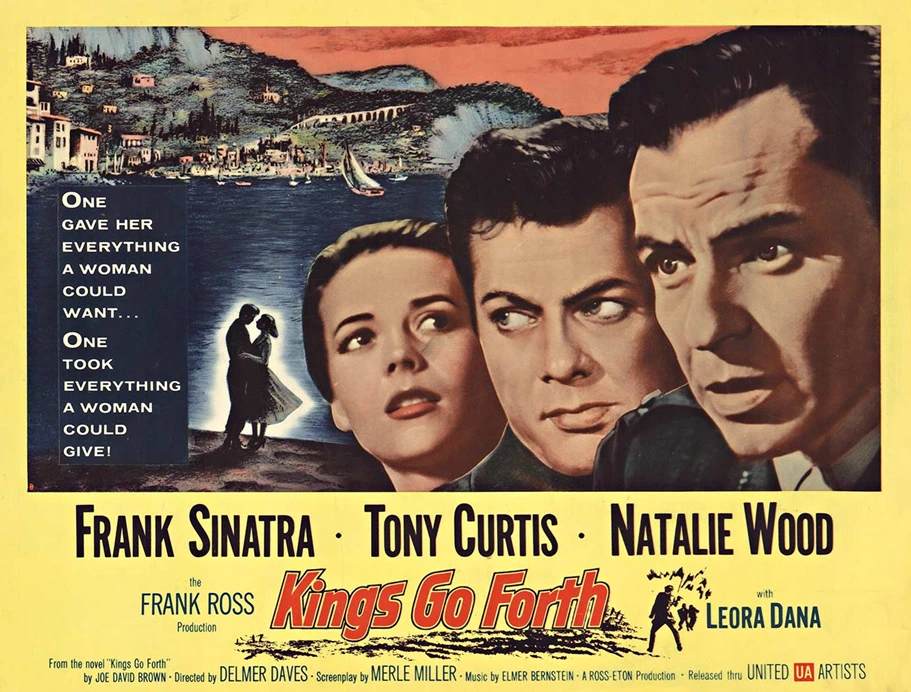
8/25:
Kings Go Forth is an uneven war picture.
Sure, it has Frank Sinatra, Tony Curtis, and Natalie Wood, and Hollywood thinks that's enough. Well, no. The
first forty minutes goes nowhere. Finally, a revelation is made: Natalie Wood is black. I laughed at that
moment. No, she isn't and is, in fact, as white as snow along with an in-and-out French accent. The role was
meant for Dorothy Dandridge, but producer Frank Ross said, "It would be impossible to use a Negro in the role
of Monique because, at the beginning of the picture, we must not know that she is a Negro."
Yet the show improves when Tony Curtis starts to appear more often and gets to have Natalie Wood as his love
interest while the old-looking Frank Sinatra is feeling dejected about it. I thought why not the latter go
for Leora Dana given that they look more age-appropriate. He was 42 and she was 34 at the time of filming
while Tony Curtis and Natalie Wood were 32 and 19, respectively. The last thirty minutes helps to reach for a
heroic conclusion of the war for both leading men.
When the one-armed Frank Sinatra and Natalie Wood reunited for the first time since then, I was okay
with it because there was no kissing going on. No matter what, he's simply too old for her and needed to move on
with his life. The first moment that Tony Curtis embraced Natalie Wood, she looked a lot beautiful, and
there was strong chemistry between these two. Hence, it's too bad they didn't do a black-and-white romance
movie of their own.
All in all, pairing Frank Sinatra with Natalie Wood is the biggest mistake of Kings Go Forth, but Tony
Curtis makes it worth watching.
King Kong (1933)
Rate:
7
Viewed:
7/05

7/05:
King Kong is an impressive horror picture with a beautiful sight of the beast who looks larger than life.
Considering the film was made in the year of 1933, it's still an amazing effort. The special effects holds up today.
That being said, I can't imagine myself sleeping in a room where I'll be snatched by Kong's hand and be dropped to
the ground from high above. It's a scary thought.
I feel sorry for Kong but hate everybody else. He isn't the monster but rather Carl Denham who
hypocritically says, "It wasn't the planes. It was the beauty that killed the beast."
All in all, King Kong is a true classic horror film that runs a bit slow.
The King of Comedy (1982)
Rate:
8
Viewed:
4/18, 6/22
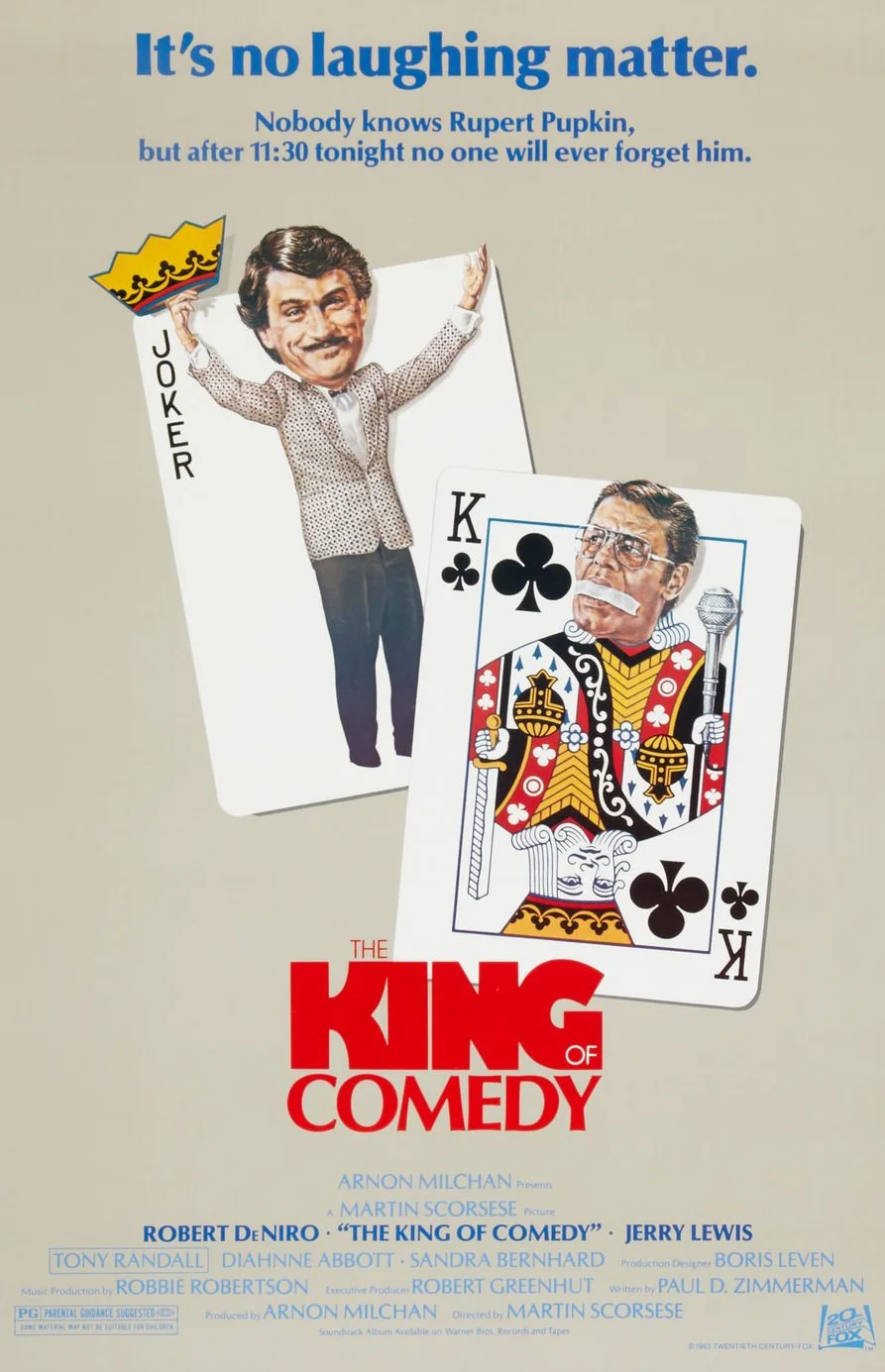
4/18:
Not really a comedy, The King of Comedy caught me by surprise because it's that good, reminding me of
Taxi Driver.
Sure, Robert De Niro plays an annoying character, but there's a purpose to what he does which will be revealed in the
long run. He's obsessed with illusions of fame just like Travis Bickle. In fact, both characters are almost exactly the
same: trouble when it comes to the separation of reality and fantasy.
To prepare for his role, Robert De Niro went after his autograph hunters and stalkers, hounding and asking them a
lot of questions. He even met with his longtime stalker to explore his mindset and asked him, "Why are you stalking me? What
do you want?" which were met with "To have dinner with you, have a drink, chat. My mom asked me to say hi."
That's a dedicated actor.
If there's anything I'm impressed with the most, it's Jerry Lewis' performance. I didn't realize who he was until after the
credits rolled. The way he behaved is professional. I like how Jerry Lewis' character handled his stalker, and I feel more
for him than anyone else.
All in all, I'll like to see The King of Comedy again since I wasn't initially expecting much.
6/22:
The King of Comedy is a disturbing film about celebrity stalkers.
You can hate his character all you want, but Robert De Niro gives a believable performance. Only the ending is unrealistic. It must
have been embarrassing for bartender Rita to be associated with him. On the other hand, Jerry Lewis and Sandra Bernhard aren't bad.
All in all, in many ways, The King of Comedy is an extension of Taxi Driver.
King of Kings (1961)
Rate:
6
Viewed:
3/25

3/25:
I wonder how many films there are that tell the exact same story about Jesus Christ's life, from birth to
resurrection, just like King of Kings.
That being said, what's the point? Is it only because they are easy moneymakers? Anyway,
King of Kings is an okay epic that stays, more or less, faithful to the Bible. If there are
complaints about this or that not being accurate, it's because the gospels conflict each other many times.
The following two passages is an example:
Matthew 27:11-14 says, "Meanwhile Jesus stood before the governor, and the governor asked him, 'Are you the
king of the Jews?' 'You have said so,' Jesus replied. When he was accused by the chief priests and the elders,
he gave no answer. Then Pilate asked him, 'Don't you hear the testimony they are bringing against you?' But
Jesus made no reply, not even to a single charge—to the great amazement of the governor."
Yet John 18:33-37 says, "Pilate then went back inside the palace, summoned Jesus and asked him, 'Are you the king
of the Jews?' 'Is that your own idea,' Jesus asked, 'or did others talk to you about me?' 'Am I a Jew?' Pilate
replied. 'Your own people and chief priests handed you over to me. What is it you have done?' Jesus said, 'My
kingdom is not of this world. If it were, my servants would fight to prevent my arrest by the Jewish leaders.
But now my kingdom is from another place.' 'You are a king, then!' said Pilate. Jesus answered, 'You say that
I am a king. In fact, the reason I was born and came into the world is to testify to the truth. Everyone on
the side of truth listens to me.'"
The cast is fine, but the makeup job is horrible all the way through. Anyone can see it plainly on Jeffrey
Hunter's face. On the other hand, the writing either passes muster or puts me to sleep. It's been up and
down a lot. Harder to bear is the epic taking three hours to sit through. At least, it doesn't try to fool me
with supernatural events.
All in all, there's probably a better version out there than King of Kings, but why do I have to
explore them all when one will suffice?
The King of Marvin Gardens (1972)
Rate:
6
Viewed:
6/16
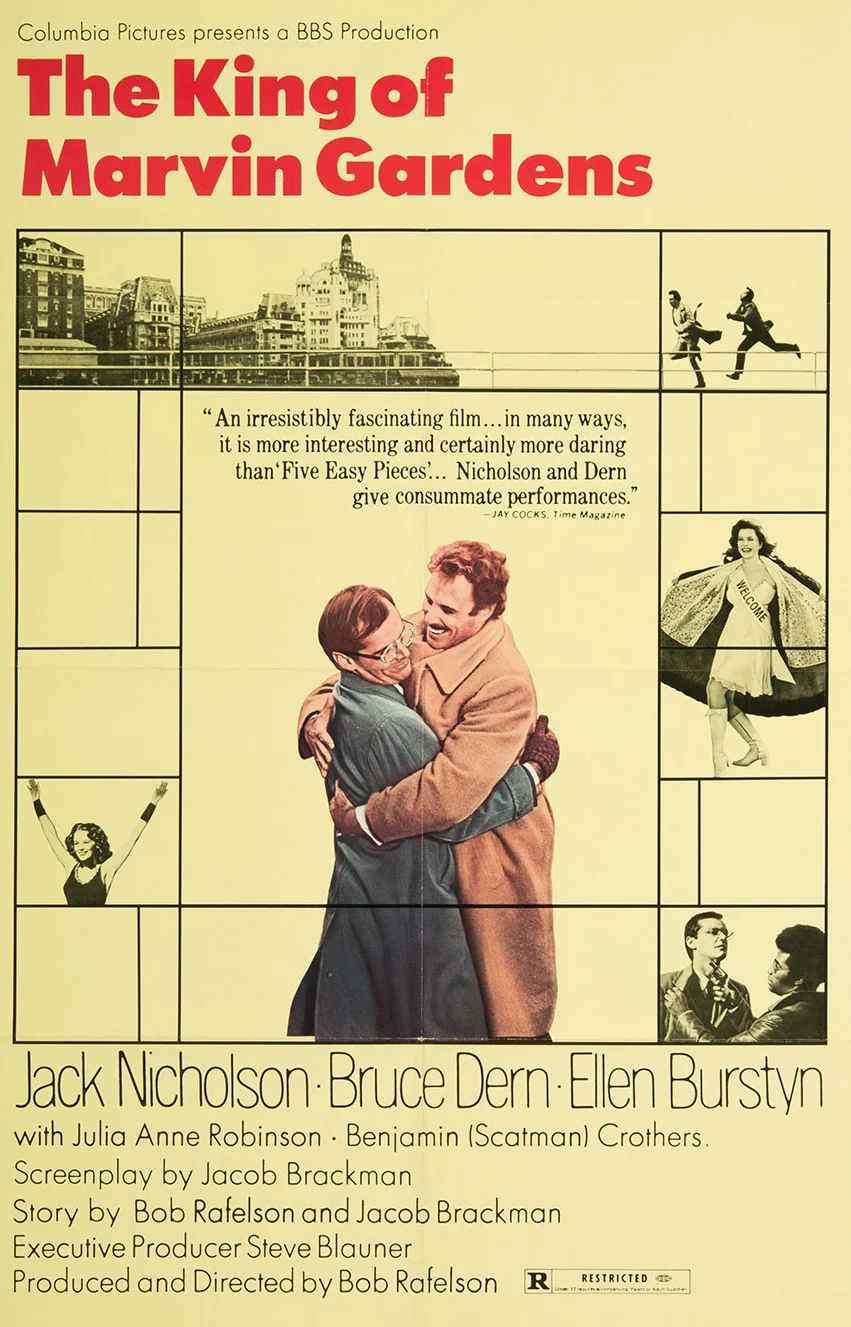
6/16:
The King of Marvin Gardens reminds me a lot of Five Easy Pieces,
but Atlantic City is better as they're both similar films.
Everybody is great. There's no taking away from their performances. They're the core. For director Bob Rafelson,
The King of Marvin Gardens is autobiographical in nature. So, don't be surprised if the movie doesn't
make sense. This is what happens.
Sadly, Julia Ann Robinson, the girl with Ellen Burstyn, died in an apartment fire that was caused by a faulty
thermostat three years after the completion of The King of Marvin Gardens. Obviously, everybody has
played Monopoly and is familiar with the names of all properties. But here's a trivia I bet they never
knew: Marvin Gardens is a misspelling of Marven Gardens. Go ahead, look it up.
All in all, it's the performances that got me through The King of Marvin Gardens.
King of New York (1990)
Rate:
6
Viewed:
10/05, 12/19
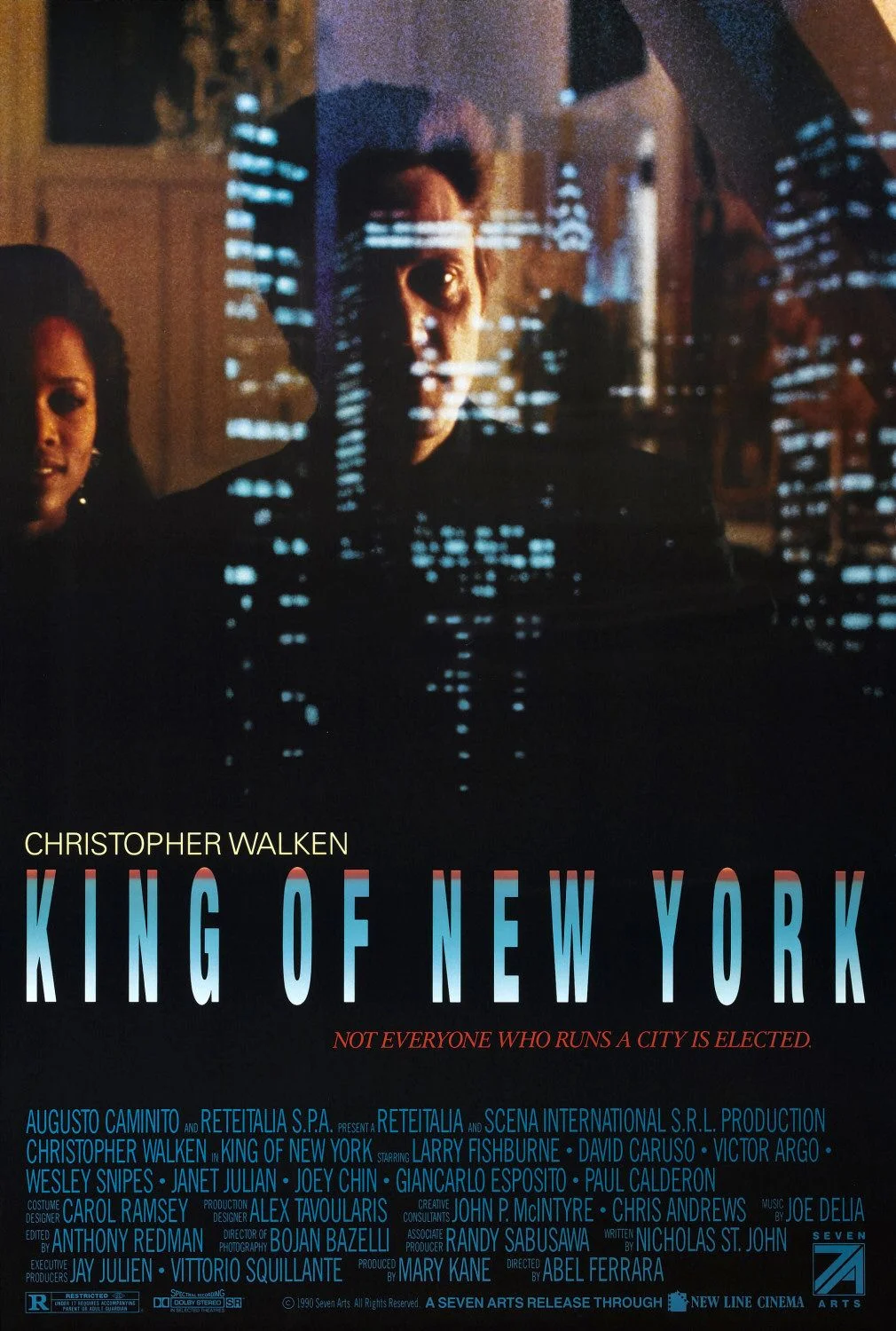
10/05:
King of New York is a disappointing, weak movie.
It places too much focus on the secondary characters but not enough on Christopher Walken. There's nothing
wrong with his performance. In fact, Christopher Walken is the sole reason why I had high expectations. Why is
there so much unnecessary screen time for David Caruso who's among the worst actors ever? How he got big
on TV is one of the greatest mysteries in life.
The plot is futile, and the message is never forthcoming. It's safe to say there isn't a clear idea of what
the movie is supposed to be about. Sure, it looks visionary and is, at times, ultra-violent, but I'm left
underwhelmed despite the cool-sounding title and Christopher Walken's face on the movie poster.
All in all, Abel Ferrara proves again that he isn't a capable director.
12/19:
My rating of King of New York has jumped from '4' to '6'.
Honestly, it's not a good movie which has always left me feeling nothing afterwards. Sure, Christopher Walken
is cast, and he's gangsta. But that's where King of New York stops which is a shame.
The fault lies with Abel Ferrara because he's not a competent director. He needs to learn to stick with what's
working well and prolong it. A good example is when Frank White started to settle in while soaking up
the glitzy life of New York City. It was the best part of the film, but Ferrara just went through it quickly
and moved on. To make matters worse, he decides to give David Caruso a large amount of screen time. Why? The
red-haired moron has no appeal whatsoever.
All in all, King of New York is a sad waste of Christopher Walken's potential to do something evil.
King of the Gypsies (1978)
Rate:
4
Viewed:
2/20
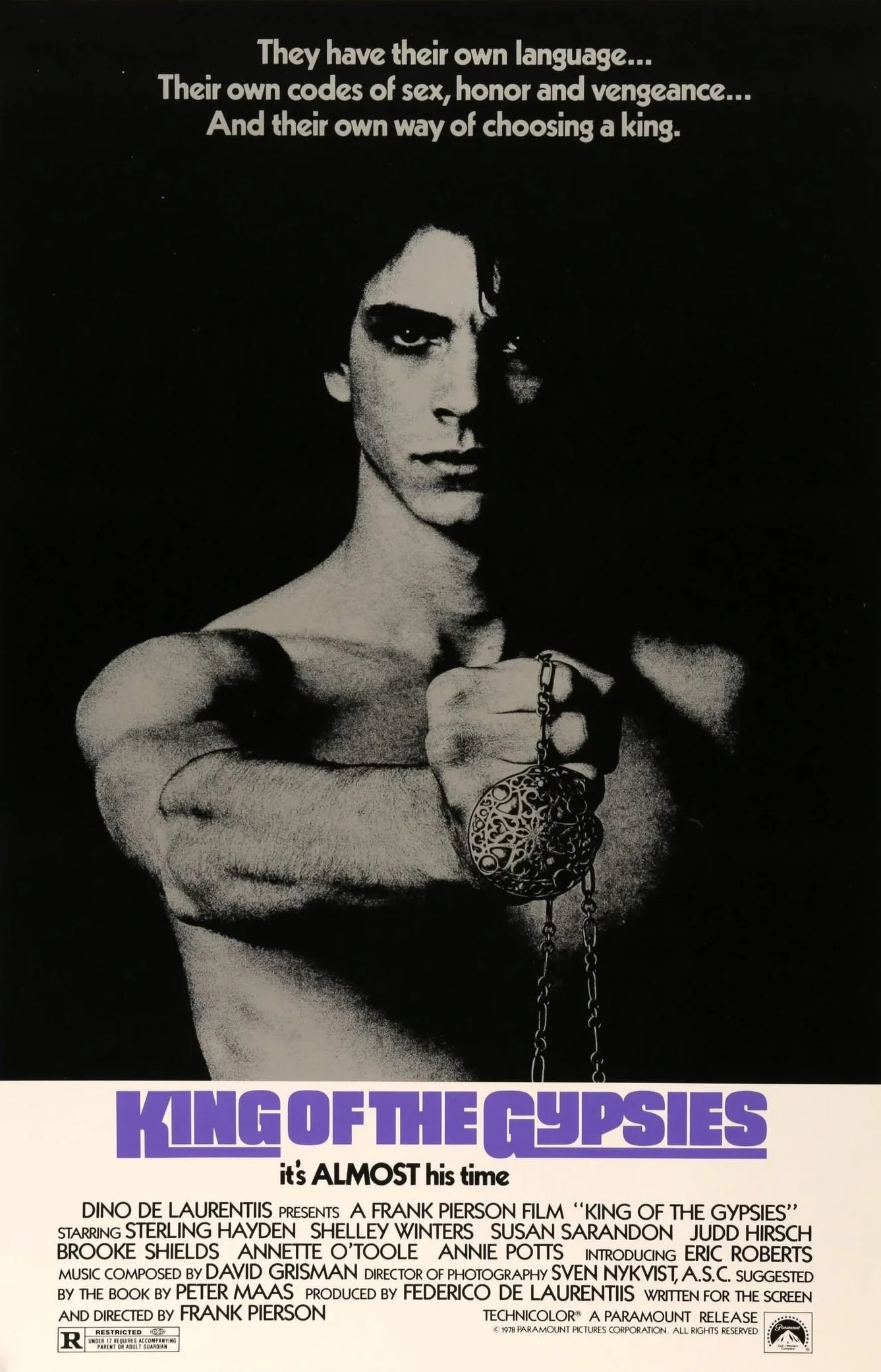
2/20:
The description of King of the Gypsies on the back of the DVD cover reads: "The intriguing web of song,
dance, treachery and superstition that makes up Gypsy culture proves too alluring for David to resist..."
The point is lost on whoever wrote it because it's not what happened in this sometimes bizarre film.
David rejected everything the culture stood for because he wanted education, something that he was denied by
his father. As a result, David was shut out of opportunities because he couldn't read or write and therefore
had no high school diploma.
When David talked about wanting to lead the Gypsies into the 20th century just to end the ways of the backwards
culture, I'm sure he meant the 21st century. Overall, that's what King of the Gypsies is about, but it's
not a good movie. Even the Gypsies look bad, having been painted as scam artists and hucksters which is what
they were and still are.
No matter what, Eric Roberts is phenomenal in his screen debut. Obviously, he was recruited for the role
because of his stereotypical "Gypsy" looks. So were the others such as Susan Sarandon, Judd Hirsch, and Annie
Potts. Poor Brooke Shields didn't have them, so she got made over, replete with a slight dose of man tan.
Oddly, Brooke Shields and Susan Sarandon repeat themselves from Pretty Baby.
Judd Hirsch is never convincing for a formidable adversary toward his son and looks like a pushover; that's
why the film doesn't work most of the time. It doesn't help, either, when Shelley Winters has to be melodramatic
while looking stupid. Sterling Hayden isn't genuine as the patriarch of the extended family.
All in all, King of the Gypsies is a sad case of Hollywood's interest in profit by taking advantage of
the Gypsy culture, but Eric Roberts' performance alone makes it worth watching.
King of the Hill (1993)
Rate:
2
Viewed:
11/25
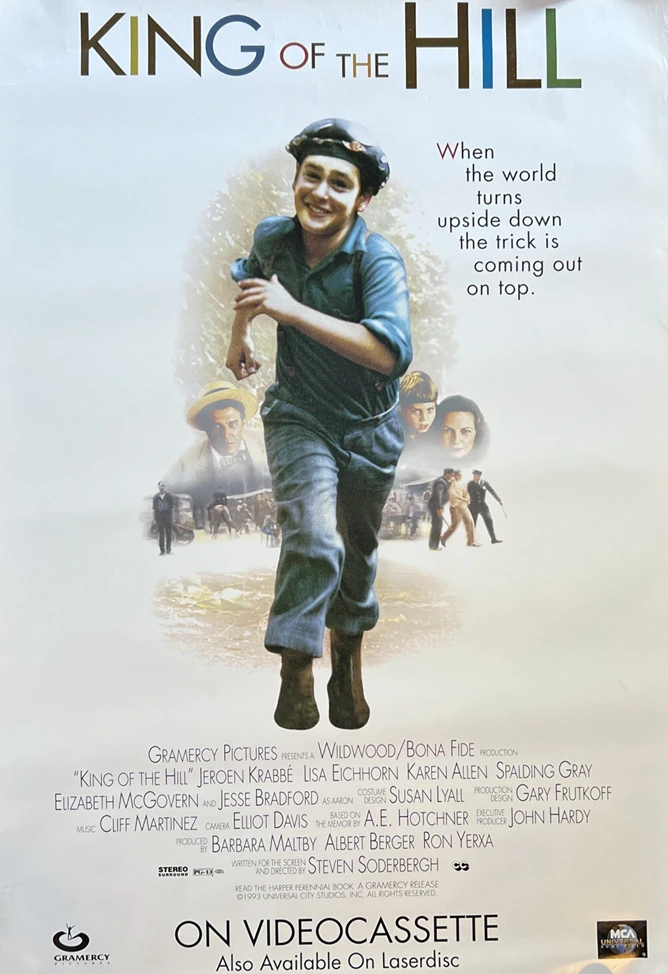
11/25:
If anyone wants to see a film about the 30's, the solution is easy: pick something made in that period of time.
Steven Soderbergh thinks he can get away with it by using tons of products in King of the Hill, but
the whole show still feels like the 90's. There's no story as well; it's been a series of "oh" incidents in
one boy's life. You're better off seeing A Bronx Tale.
Speaking of the boy who happens to be a pathological liar, this piece of work should've ended Jesse Bradford's
time in Hollywood. Despite being photogenic, he's not much of an actor. Had I seen
Swimfan afterwards, I would've been instantly tired of him.
St. Louis? Ha! 95% of the time has been interiors. They could've done the film in Texarkana, Texas, and it
wouldn't have made a difference. Anybody coming for that specifically are sure to be disappointed.
All in all, King of the Hill is pointless which explains why it was a box-office bomb, taking in
mere $1 million against a budget of $8 million.
King Ralph (1991)
Rate:
7
Viewed:
1/15
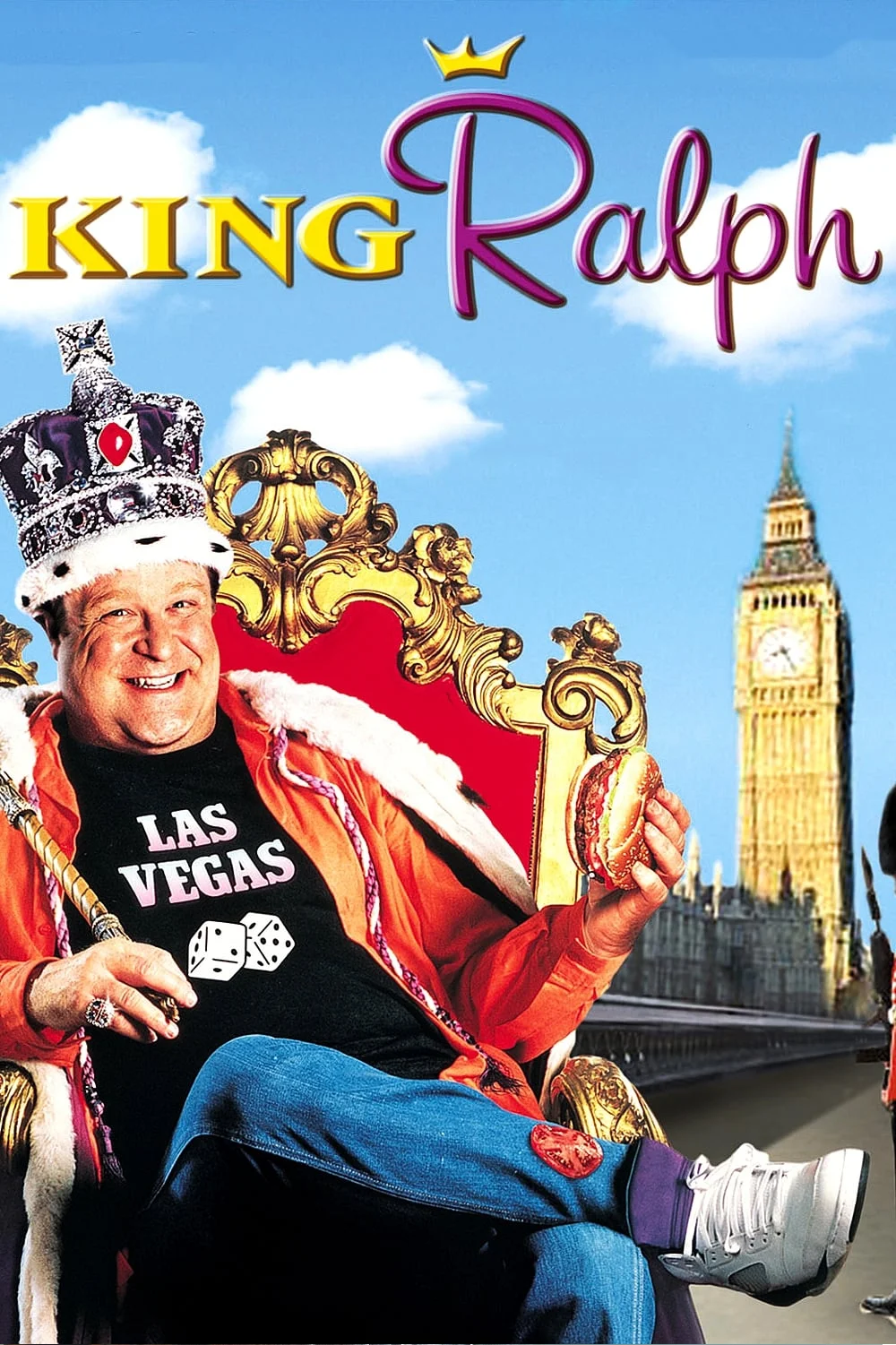
1/15:
Intending to be a comedy, King Ralph is more on the serious side.
John Goodman is perfect for the role, and his best moment is when he walked through the door in his Cubs hat
and Packers jacket after being introduced as the King of Great Britain and Northern Ireland, Head of the
Commonwealth, Defender of the Faith, and whatever the hell else.
Being the sole reason why I decided to see the movie in the first place, John Goodman can be funny when given the
chance. Peter O'Toole is a good sport as his assistant and is nice about it.
Sadly, I don't care about England and its silly traditions. One thing I dislike is how the romance aspect is the
focal point which comes so soon. I rather want to see Ralph, being an American, learn the English customs and
take in the cultural differences as he tours around the country. It's what makes international travel so
fascinating, resulting in missed opportunities for comedy.
All in all, King Ralph is in good fun despite the flaws.
Kings of the Sun (1963)
Rate:
8
Viewed:
12/16, 12/19
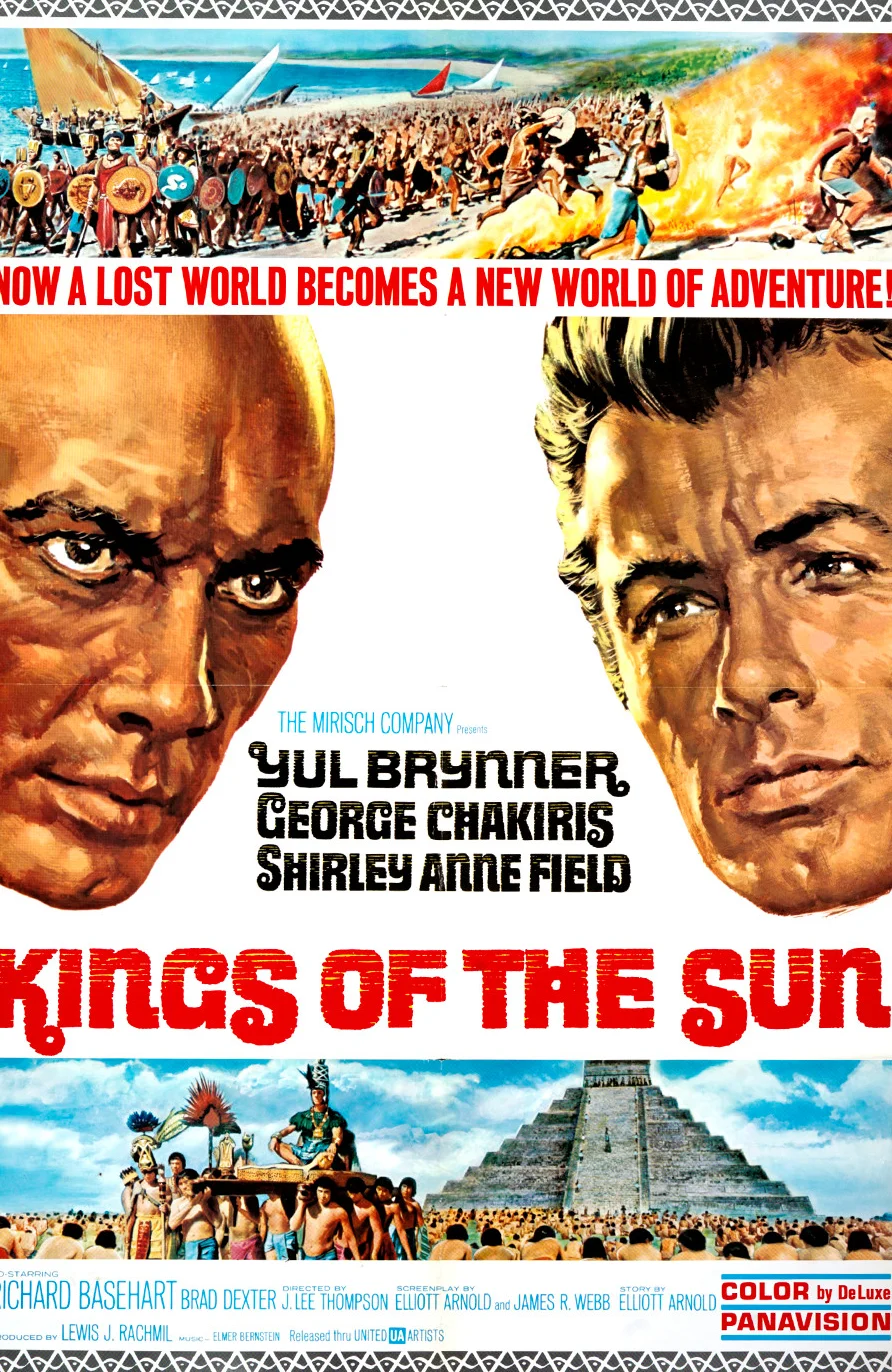
12/16:
Well, I'm against the idea of a white thespian who's brownfaced to play a foreign character.
But based on the strength of Yul Brynner's acting, I'm going to let this one slide. Why a female reviewer
liked Kings of the Sun, she mentioned the following reasons:
1. Yul Brynner.
2. Yul Brynner in a loin cloth.
3. Yul Brynner's body in a dark, rich suntan.
4. Yul Brynner's body glistening with oil.
5. Yul Brynner with his suntan oiled limbs stretched out and tied.
6. Yul Brynner writhing around on a bed of hay.
7. Yul Brynner strutting around like a jaguar.
8. Yul Brynner in several seductive poses.
9. Yul Brynner's deep sexy man voice whispering sweet nothings, even if it's to the goofy blind Ixchel.
I guess the defense has made the case and therefore rests. Hence, it's all about Yul Brynner.
Forget about the rest of the film. The serious intensity in his eyes is unmatched.
Compared to the cast, Yul Brynner is on another level, and nobody, not even Shirley Field, can keep up with him. The way
he played with the shadow inside the jail is brilliant stuff. Here's a fun fact: Marlon Brando learned so much
from him about the use of light and dark during Morituri that he took advantage of them for
Apocalypse Now.
All in all, anytime you think of Kings of the Sun, the only image that should be on your mind is Yul Brynner.
12/16:
Kings of the Sun is more of a film for children than anything else, but it's hard to deny the power
of Yul Brynner's charismatic performance.
Yeah, the brownface of all white actors is embarrassing, to say the least, and the heavy makeup on Yul's face is atrocious.
All I could think of is: why didn't they get real Mexicans instead? The truth is: without star power, Kings of the Sun
wouldn't have been made. Yul Brynner's presence alone makes up for the transgressions. He's positively stirring and thus
elevates Kings of the Sun as a whole. It may be the only Hollywood film about the Mayans which is saying something.
I like the story and the action to turn it into a near epic about the battle of three civilizations with thousands of extras.
Then, there's the question of human sacrifice which was widely practiced by the Mayans in the heyday. Now, it seems to be a
silly thing to do. Instead, the film is about relationships.
The nice part is the sight of Chichén Itzá which is the real thing. It's located in Mexico's Yucatán Peninsula and is now
among the new Seven Wonders of the World. The list had to be redone because six of the old seven wonders either don't exist or
are made-up.
All in all, Kings of the Sun has to be seen for Yul Brynner.
A Kiss Before Dying (1956)
Rate:
4
Viewed:
8/14
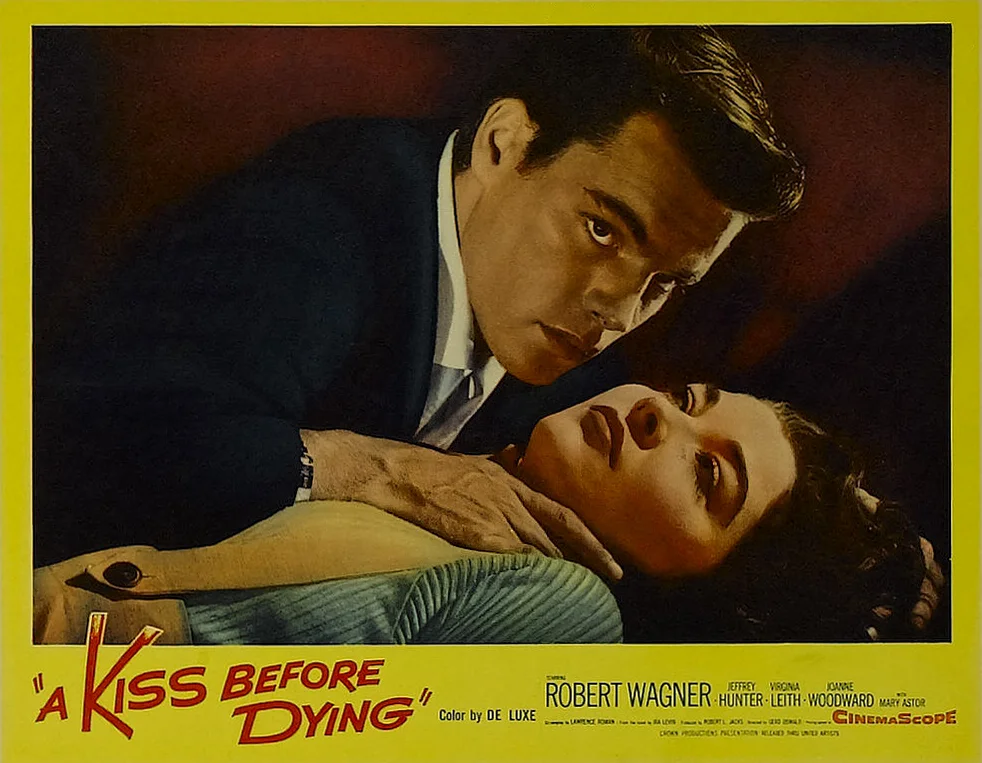
8/14:
A Kiss Before Dying has all the qualities of a B picture and is exactly like
An American Tragedy/A Place in the Sun but never rises above
mediocrity.
The plot isn't believable, and the acting doesn't get better, too. Robert Wagner is okay but does
nothing for me. In many ways, he's comparable to Alain Delon. I wonder who's the better, or rather worse,
actor. At any rate, it's a great poster of him right there.
Joanne Woodward once said A Kiss Before Dying was her worst picture. The assessment may be correct
because she's hideously ugly in it. The murder of her character takes too long to accomplish, but she's better
off dead anyway. Virginia Leith, who plays Ellen Kingship, looks like a man because I can see a slight five
o'clock shadow on her jowl. She can't act, either. Her character is so dumb to play a detective that she's
indirectly responsible for letting one guy be killed for nothing.
If one sees a prepared suicide note right in front of him and is about to be killed, he should at least put up
a fight. So, screw the chivalry code. Three murders, not two as mentioned, were committed, but the film censors
forbid Hollywood from using the word "pregnancy." There are many good-looking people and pretty colors to prevent
the film to be noir enough. The ending is a dud, leaving me cheated.
All in all, A Kiss Before Dying is slow, lacks character development, and doesn't have enough verve to
get the momentum rolling.
A Kiss Before Dying (1991)
Rate:
6
Viewed:
2/15, 8/20
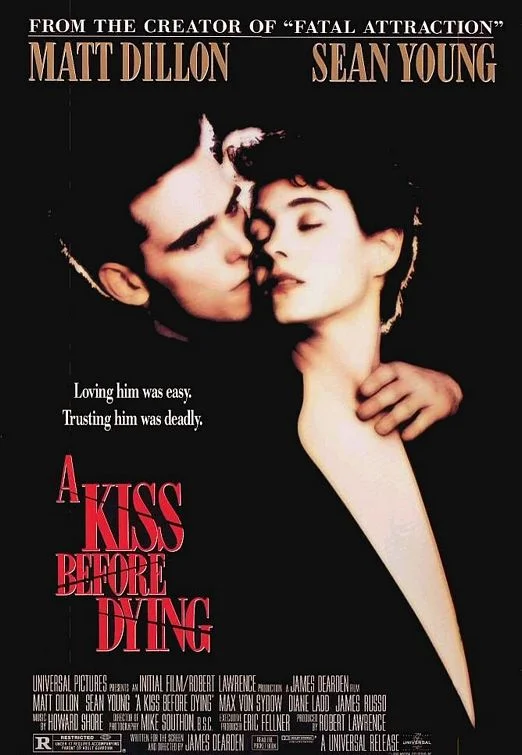
2/15:
Many reviewers thought less of the 1991 version of
A Kiss Before Dying and chided Sean Young for her performance.
Honestly, I've found it superior to the original. Matt Dillon is by far a better actor than Robert Wagner. He's
excellent as the schemer Jonathan Corliss who, as a child, saw the company's logo on the railcars passing by
his house daily and wanted it to pay for his father's death. Then, he plans his ascension to the top by acquiring
the established family business for himself through the magnate's daughter. It's fascinating but, of course, too
simplistic.
Sean Young does more than enough to play the unsuspecting daughter who can't shake off her twin sister's suicide.
Max von Sydow is superb as the father, and his scenes with Matt Dillon, who's surprisingly at ease, are the best
parts. Another area of improvement over the original is the pace which is quicker and gets to the point rather
well. There are clever, albeit somewhat Hitchcockian, moments that are taken from the original and rearranged
to create a good story.
All in all, thanks to Matt Dillon, the 1991 version of
A Kiss Before Dying is a fine remake, superseding
the original in all aspects.
8/20:
Wow...Sean Young and Matt Dillon in the same film.
I wish A Kiss Before Dying was set on fire by them, yet they never do. All the Hitchcockian elements
are right there for the taking. I like the story and the symbolic ending, but the biggest trouble is the
underwhelming acting by the principal leads.
Occasionally, Matt Dillon can be great; however, he keeps coming up short here. The energy is not there just
like how Max von Sydow phoned it in. Therefore, I blame Sean Young for the lack of sexual tension; she was sexy
in 80's films such as No Way Out,
The Boost, and Cousins. In
A Kiss Before Dying, what the hell happened? Her character is so frumpy that it's no wonder why
Jonathan Corliss wanted her family's money after all.
All in all, although lackluster, I prefer the remake of
A Kiss Before Dying over the original.
Kiss Kiss Bang Bang (2005)
Rate:
2
Viewed:
5/21
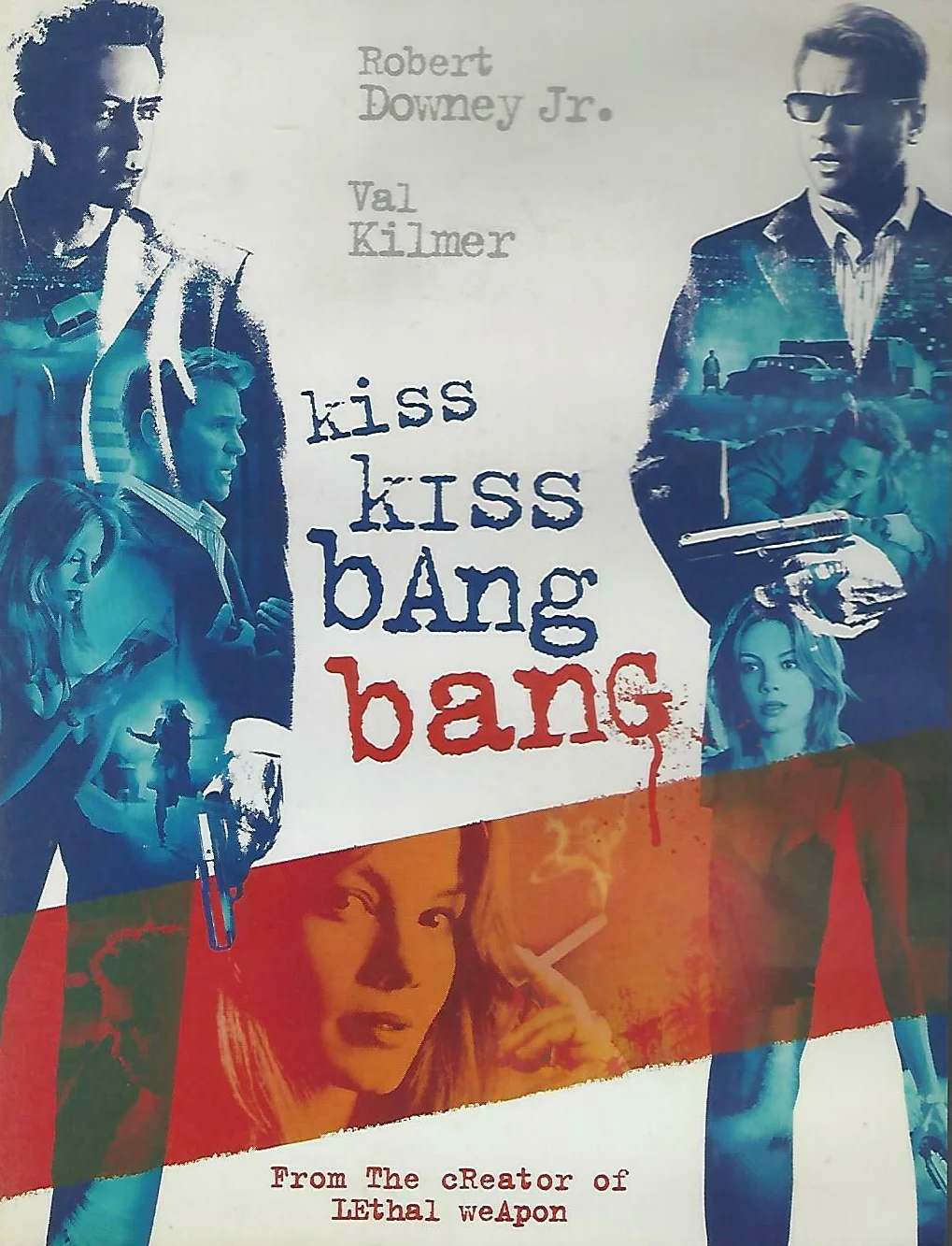
5/21:
The first fifteen minutes is usually a reliable indicator of how the film will go the rest of the way, and
Kiss Kiss Bang Bang went south this time.
I got fooled into seeing it because the cast included Val Kilmer. I thought his days of horrible 80's comedies were long
behind him, but I was proved wrong. The same can be said of Robert Downey, Jr., too. He had a much longer streak of them than
Val Kilmer. Again, I was wrong.
Yet the biggest surprise is that Shane Black wrote this homophobic piece of shit. This is the guy who did
Lethal Weapon, The Monster Squad, and
The Last Boy Scout with some uncredited contribution to
Predator. He has a way with words while creating a bankable screenplay.
Well, nine years of going AWOL after the horribly made The Long Kiss Goodnight,
Shane Black managed to come up with something that's the most confusing of his career: Kiss Kiss Bang Bang. The dialogue is
at once quick and hard to follow, demanding the expertise of top-shelf actors. Val Kilmer fits the bill, but Robert Downey, Jr.,
and Michelle Monaghan are wrong for it.
Making matters worse is the high amount of scenes that are either terrible, unbelievable, or pointless. A case in point is
Harry who's thrown across the overpass until landing on the coffin. Despite his zero experience with guns, he's able to
shoot at the bad guys perfectly from a great distance without ever reloading. At the same time, Harry is supposed to be
physically weak because of his cut-off pinky finger. Yeah, okay.
All in all, because of Shane Black trying too hard to emulate the entertaining mess of
The Big Sleep, Kiss Kiss Bang Bang is suck suck bad bad.
Kiss Me Deadly (1955)
Rate:
10
Viewed:
9/13, 7/18
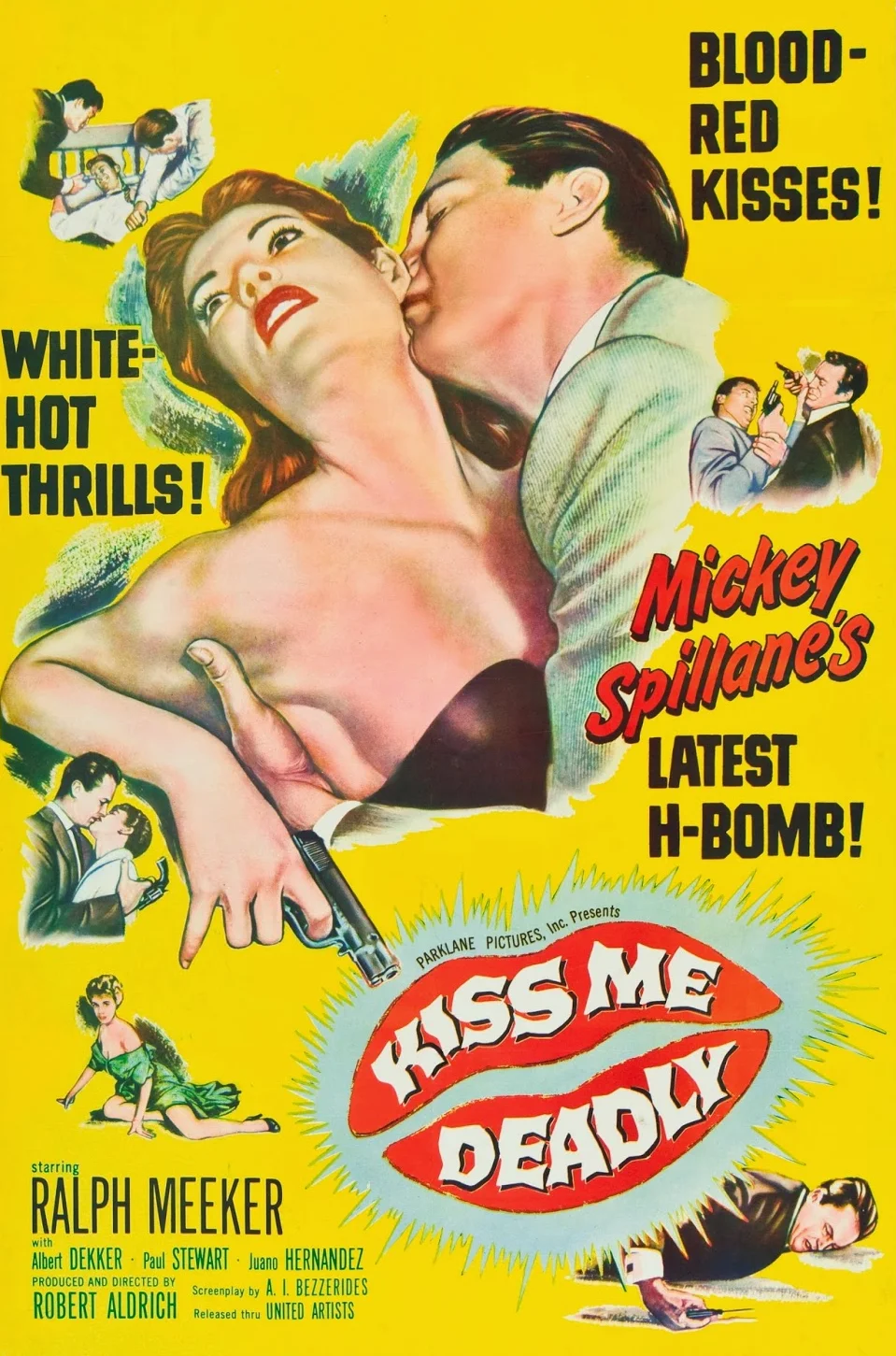
9/13:
After a slow start, Kiss Me Deadly picks up the pace and gets the ball rolling as soon as Mike Hammer delves deeper
into the mystery of the girl's disappearance.
It gets more and more interesting as time goes on until the final ending which is unexpected. Many noir
pictures fall apart because of a weakness in either acting, plot, or pace. But Kiss Me Deadly has this locked in.
There's a slow gradual buildup to something sinister. Tough characters appear one by one throughout. It's gritty on the
noir level because quite simply, people die. Furthermore, they're pushed over for selfish aims and are
mercilessly killed.
Well known for The Dirty Dozen, Robert Aldrich's direction is perfect and makes the
plot interesting to follow. Ralph Meeker will always be remembered as Mike Hammer who gets involved with the case when he shouldn't
have because there's no money involved. He almost reminds me of Jake Gittes from Chinatown.
Some critics viewed the ending as a letdown. On the contrary, I think it's fitting because the expectation of how
the movie was going to end was so great that the reason had to be big enough to match it. Incidentally, the mysterious
box is probably where Pulp Fiction got the idea from.
All in all, Kiss Me Deadly is among the greatest films noirs made.
7/18:
Kiss Me Deadly is one of the top films noirs made, signaling the end of a time-honored genre that dates
back to the early 40's.
Sure, the picture moves slowly, and then, things get cooking in the last twenty minutes, making the wait well
worth it. Los Angeles has been long considered as film noir haven, and the movie makes an extensive use of its
locations which are now gone forever.
Countless viewers expect a mystery to be solved through wham-bam magic that comes out of nowhere, but that's not how it works
in real life. What Mike Hammer did is flip over rocks, see what comes up, and do a follow-up.
It took a while, but the more bad things were happening, the closer he got to the core of the mystery.
The conclusion is unexpected, turning the picture into a sci-fi film noir. Now, I can see where Quentin Tarantino
got the idea from for the briefcase in Pulp Fiction. Ralph Meeker is perfect as Mike Hammer;
he'll always be remembered for this. An interesting footnote: the actress who appears at the beginning of the film is
Cloris Leachman. It's her first film. She went on to win the Best Supporting Actress Oscar for
The Last Picture Show.
All in all, Kiss Me Deadly belongs in the top ten of greatest films noirs.
Kiss of Death (1947)
Rate:
5
Viewed:
4/14, 6/16
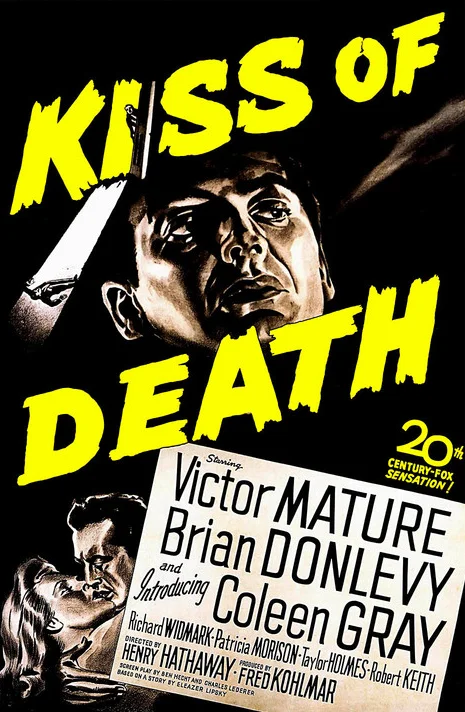
4/14:
Of all Henry Hathaway's films, Kiss of Death is the best.
It's high film noir heaven. The story is taut and well-written because of co-writer Ben Hecht's touch.
Effective is the use of actual locations in many scenes. Even more so is the performances.
I love Victor Mature's acting here as he displays many emotions which are suited to different situational
moments. Coleen Gray is wonderful as Nick Bianco's supporting wife. Now, the true reason why the film is
elevated higher for that certain oomph is Richard Widmark's portrayal of Tommy Udo. It's one of the all-time
great villainous performances, making Kiss of Death a bona fide film noir.
Richard Widmark is chilling and sinister in a maniacal way. It's the way he looks and acts: his pervasive
chuckle, toothy grin, garb including the fedora, wide eyes, and constant usage of the word "squirt." The
incredible death scene of a wheelchair-bound mother who's pushed down the flight of stairs gets Tommy Udo a
gold star for brutal villainy. It never happens in 40's cinema which is shocking enough.
Hence, Richard Widmark's screen debut earned him a well-deserved Oscar nomination. In fact, I'm surprised the
Academy recognized his work. Bravo, Mr. Richard Widmark. By the way, there's a likeness of Tommy Udo through Jack
Nicholson's Joker in Batman, so it must be where the inspiration came from.
All in all, Richard Widmark's Tommy Udo is the real Kiss of Death.
6/16:
Dropping my rating of '10' to '5', I realize now Kiss of Death is a slow movie with an average story.
In fact, there isn't much of a story. Why does the A.D.A. keep giving Nick Bianco all the breaks? What makes
him so special? Is it because he has two little girls? That's weak shit. And why is the girl in love with him?
He's a career criminal, for Pete's sake. What sort of legitimate jobs can Nick get to support his family? Wake
me up when she figures that out.
As Tommy Udo, Richard Widmark steals the show. There's no question about it. I think he should've had more
screen time. There's too little of him. How he got set up through the harebrained scheme to
die is stupid. Give Tommy Udo his own movie as a consolation prize.
All in all, the only reason to see Kiss of Death is Richard Widmark's Oscar-worthy performance.
Kiss of Death (1995)
Rate:
6
Viewed:
9/13
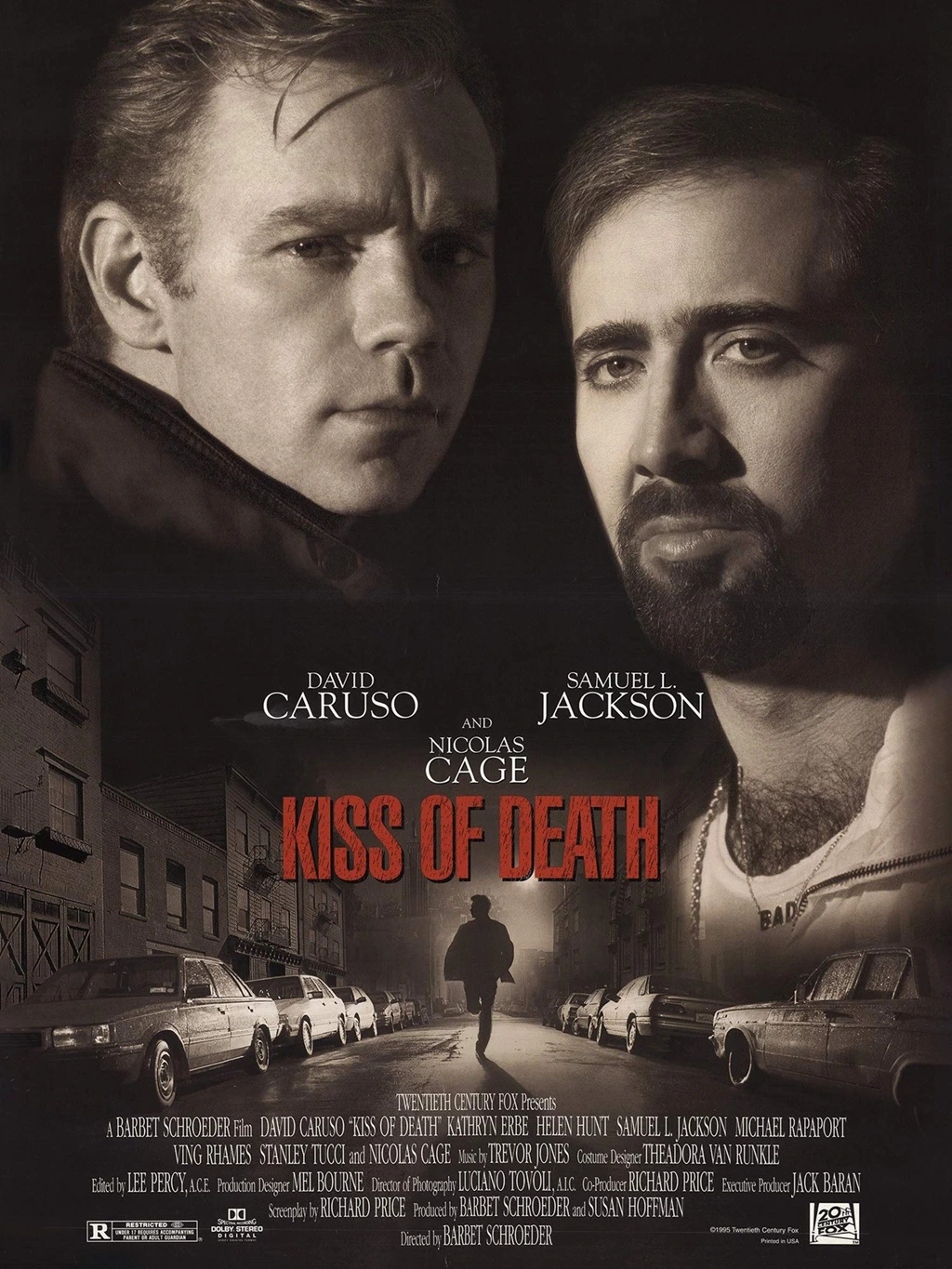
9/13:
Kiss of Death is an okay crime picture as far as I'm concerned.
I just have a hard time accepting David Caruso in the leading role because he's a bona fide crappy actor who
belongs in the same league with Brad Dourif, the Marlon Brando of phony acting. He should be tortured in every
film.
David Caruso and Nicolas Cage being together in the same frame, there's simply no contest. Having a small amount
of screen time, the latter is mesmerizing and steals every scene. He's the sole reason why I decided to see
the film again. However, his Little Junior character is underutilized and thus should be expanded. Making him
to be more like Dennis Hopper's Frank Booth will be a good idea, too. His co-star, Samuel L. Jackson, turns in
a solid performance.
On the other hand, Kiss of Death can be thought of as a Miami Vice reunion for at least six
actors: Ving Rhames, Stanley Tucci, Anthony Heald, Philip Baker Hall, Paul Calderon, and Jay Sanders. They
appeared in different episodes during five seasons.
All in all, Kiss of Death is better off without David Caruso while it needs more defining scenes with
Nicolas Cage.
Kiss of the Spider Woman (1985)
Rate:
5
Viewed:
12/13
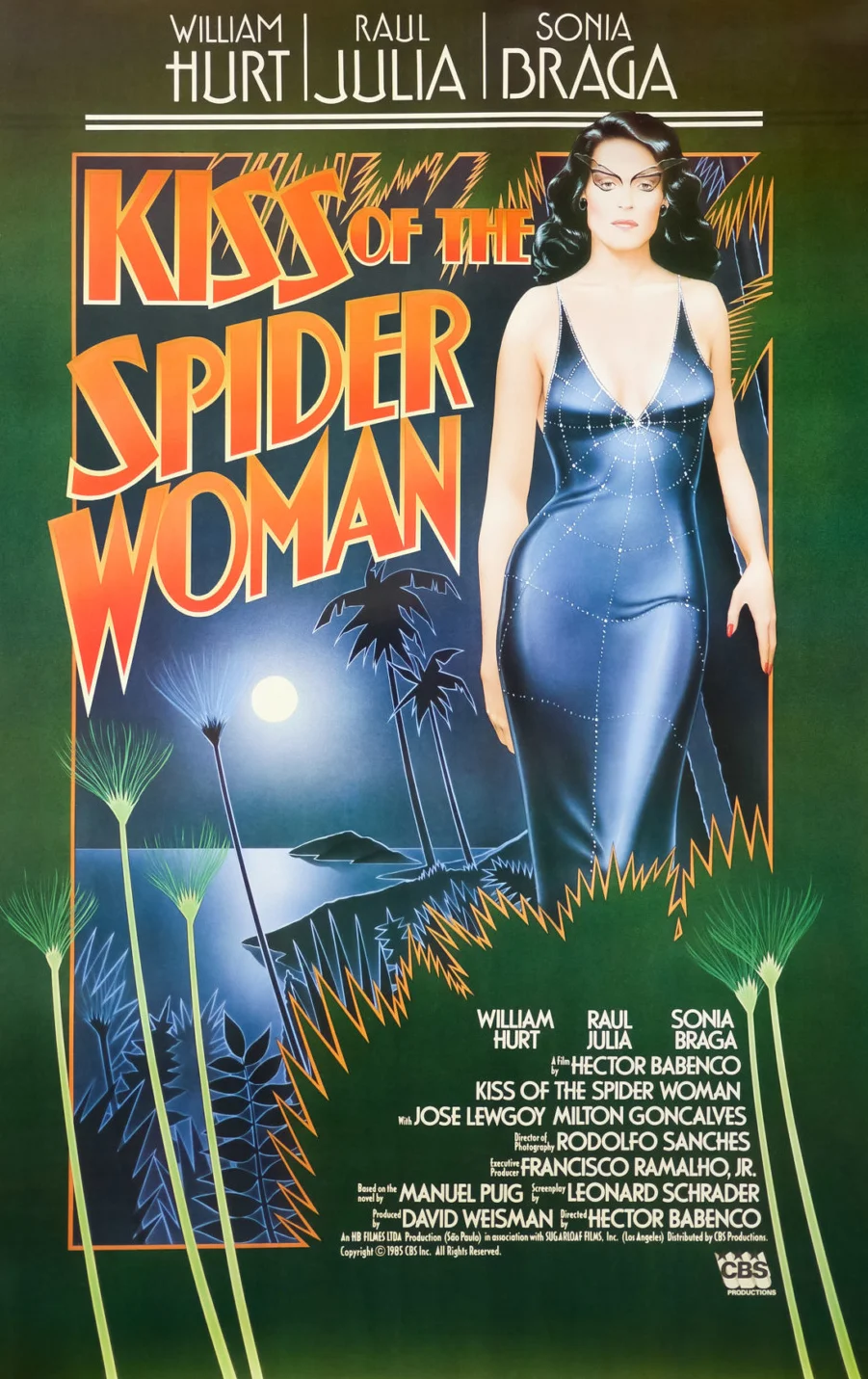
12/13:
As much as I like William Hurt, his performance is a shining paragon of why it's too easy for anyone to play
a transsexual and receive a shitload of acting awards.
Oddly, the Academy Awards has a long history of giving out Oscar nominations and wins for this type of performance:
John Lithgow, Jaye Davidson, Dustin Hoffman, Hilary Swank, Chris Sarandon, and so on. As of 2014, a recent addition
to this list is Jared Leto of Dallas Buyers Club. Next to playing a
drunk, it's by far the easiest role to score a win, and I don't know why. Perhaps the voting members can relate
to it a great deal?
As for Kiss of the Spider Woman, it's a dull film with nothing much happening. Most of the time is spent on
the made-up story about a singing female who's wooed by a Nazi German at some nightlife club. When I'm taken to
the end of the real "play," it's suddenly over with no apparent resolve. However, the performances by William Hurt
and Raul Julia are outstanding.
All in all, Kiss of the Spider Woman should be retitled as Kiss of the Transsexual.
Kiss the Blood Off My Hands (1948)
Rate:
9
Viewed:
6/24
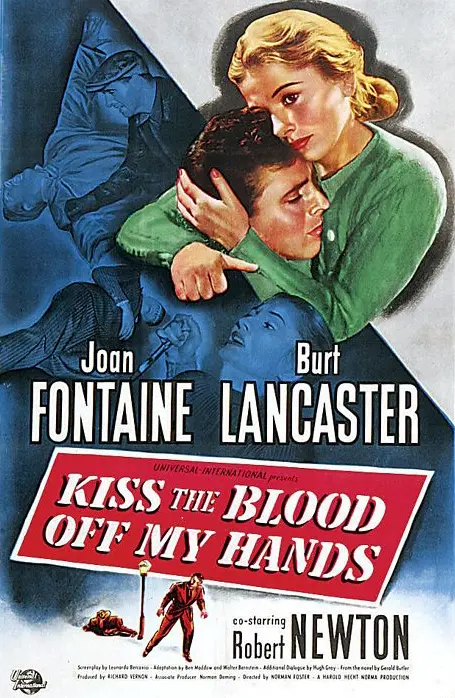
6/24:
Burt Lancaster can now be safely added to the top tier of film noir male icons which had been populated
by only two actors: Humphrey Bogart and Robert Mitchum.
Think of the fantastic movies he starred in: The Killers,
I Walk Alone, and Criss Cross. Here's
another with a powerful title: Kiss the Blood Off My Hands. As Bill Saunders, Burt Lancaster is extremely
irresistible, and Joan Fontaine can't have enough of him, hence their rock-solid chemistry.
The story is interesting in the film noir sense: a doomed murderer who's always looking for a way out and
needs a good-hearted dame to believe in him. From start to finish, Russell Metty's photography is unbelievable;
it's not often that a genre is so well-represented this way. Equally rare is the ending that's left as an
open-ended question. My guess is the couple will find a way out as long as they've successfully escaped to
another country.
By the way, the cat o' nine tails whipping scene wasn't faked. Burt Lancaster insisted on it to achieve
realism, and he was in pain the following day.
All in all, thanks to Burt Lancaster's larger-than-life persona, Kiss the Blood Off My Hands is a
must-see for film noir lovers.
Kiss the Girls (1997)
Rate:
4
Viewed:
5/04, 4/25

4/25:
My rating for Kiss the Girls remains unchanged.
It's still terrible, no matter how solid Morgan Freeman's acting is after his work in
Seven. When the masked killer first uttered a couple of lines, I knew it
had to be Cary Elwes and felt the same way back in 1997. Hence, I was waiting for the other shoe to drop the
whole time. What sucks is it's Tony Goldwyn's voice, no matter what. That's why I hate being
manipulated by Hollywood.
By the way, how does Cary Elwes' character have the time to play both sides of the fence and the money to own
a huge former slave plantation with subterranean tunnels? One reviewer said, "Think about it. This chap
doesn't even have a concierge on his staff, let alone a maid or a chef. Think of all the groceries he'd have
to buy, the meals he'd have to prepare, the clothes he'd have to wash, and the toilets he'd have to keep running."
A glorified hanger-on, Ashley Judd is an awful actress. Letting her character, Kate McTiernan, tag along
with Alex Cross to catch the killer makes no sense. Both are too emotionally involved and shouldn't
have been allowed in the case from the get-go. Once Kate was saved, her time ended. Despite the FBI and North
Carolina police being involved, why does Alex Cross have exclusive access to the only survivor of the ordeal?
Oh, hey...what happens if there's no purchase record of Sistol online? Where does everybody go? Of course, they
always wait for the next victim and collect more clues until the serial killer screws up.
When three people were in California along with the help of a LAPD officer, I thought the goal was to collect
more information from Dr. William Rudolph in order to learn of the secret location in North Carolina where the
rest of the girls were being held hostage. I guess not. Instead, they stage an illegal surveillance operation
without a warrant. In fact, the doctor has enough to declare the whole thing inadmissible due to the violation of
his Fourth Amendment rights. There wasn't even a probable cause to begin with.
All in all, Kiss the Girls will kiss any shred of believability goodbye.
Klute (1971)
Rate:
2
Viewed:
8/06

8/06:
My, my...an Academy Award for Jane Fonda.
And for what? This is a travesty. Klute is nothing special. It's an ordinary film with ordinary performances
and an ordinary storyline that meanders constantly. Because the killer can be spotted right away, it gives me no incentive
to follow through for almost two hours. This one should've been called Bree because it's all about Jane Fonda's worthless
character, not John Klute. Donald Sutherland could've played a furniture to pass the time.
If an half-hour can be cut out to make the story more taut, director Alan J. Pakula might have transformed Klute into a
better murder mystery picture. It'll be nice to care about the characters, too. If some light can be shed on the reason for
John Klute's mysterious demeanor, that will be fantastic.
All in all, Klute is about Jane Fonda showing off her nipples through her braless clothes, hence the Oscar win.
The Knockout (1914)
Rate:
2
Viewed:
9/06
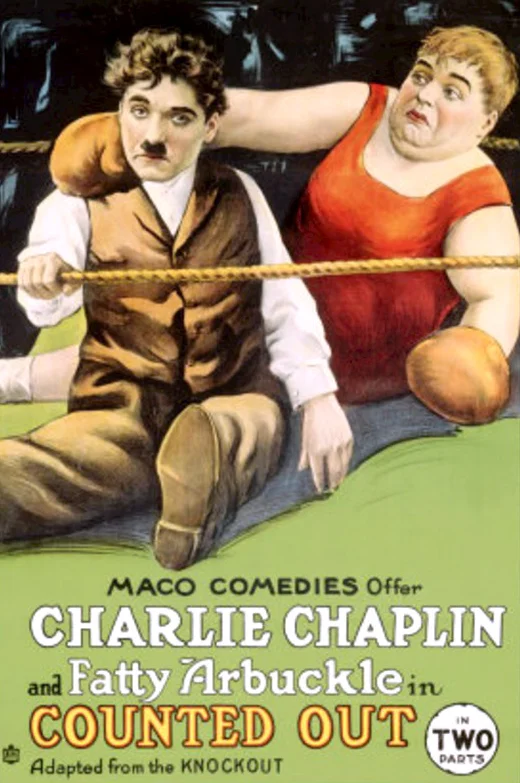
9/06:
The Knockout is somewhat better than most of Charlie Chaplin's shorts which have been horrid to watch.
There's a change of scenery, a change in the length of viewing, and a change of action, but it's still the same crap like the
rest. Fatty Arbuckle proves to be another useless silent screen actor. He being blacklisted from Hollywood after the
conclusion of three murder trials is no big loss.
All in all, The Knockout is another redundant Chaplin film short.
Krakatoa, East of Java (1968)
Rate:
3
Viewed:
7/25

7/25:
So many things wrong, and where to begin?
Java is an island that's part of Indonesia, and to the left of it is Krakatoa. So...why is the film called
Krakatoa, East of Java? Perhaps Hollywood is in the business of reading maps upside down? Lack of
intelligence can't be ruled out, either.
To save face, the film is renamed Volcano, but the damage is already done, not to mention that it only
takes a few hours instead of days to reach Krakatoa from Anjer since they're thirty miles apart. Let's not get
into Palembang, where the missionary school is at the beginning, which is 220 miles away from Krakatoa.
One of the deadliest volcanic eruptions in recorded history occurred on Krakatoa from May 20 to October 21 of
1883, killing over 36,000 people. But most of the facts related to it won't be part of the show in
Krakatoa, East of Java. It's rather concerned with a shipwreck treasure hunter, a laudanum addict, a
saloon singer, four Japanese female divers, a couple of Italian balloonists, pearls, some lost kid named Peter,
and a whole bunch of others. You see what I mean about lack of intelligence, eh?
When the steamer Batavia Queen was en route to the coast off Krakatoa, everybody saw and heard the
explosion yet thought nothing of it. That's because Hollywood failed to show the aftereffect: the falling of
ashes which stretched for 300 miles in radius. As for the sound, it also failed to mention the event was probably
the loudest ever, reaching at least 300 decibels close by, enough to render everybody totally deaf for life,
and was still reverberating 3,000 miles away.
Did the initial warnings dissuade anyone from going further? Nope, they pressed on and even witnessed dead
fish which had to be the result of sulfuric acid. Given this fact, to save the children and adults
from a sinking boat, many on Batavia Queen dove into the water in a massive rescue effort. And everything
is A-OK. Of course, Hollywood shan't go into the acid rain stuff to keep things real.
Remember the two Italians? They went up in the air and floated away in the defective hot air balloon, causing
them to go through a fjord for miles before entering the crater of Krakatoa only to be pushed back to the air.
The next shot is of them being close to where they started...right next to the Batavia Queen!
Later on, Sal Mineo's character is shown to have died in a fire on the boat. Imagine my reaction in the final
thirty minutes of the film when he appeared to be fine and very much alive. How about the laudanum addict who
said he's better off on Krakatoa or an island nearby than the steamer while the tsunami is coming? In
reality, everybody on the obvious toy model ship should've died as well. And the natives were living on
Krakatoa, next to a very, very active volcano? Uh, right...carry on.
Speaking of people jumping off the steamer to rescue kids and adults on a sinking boat, I didn't see most of
the crew during the film. Sure, they were there on the quay at the beginning including one black man (that's
Geoffrey Holder of The Wiz fame on Broadway). Once the steamer took
off, they disappeared like rats. As many of them as there were, healthy and strong dudes mind you, they got
overpowered by these weak prisoners shackled in the hold for a long time? Hardly likely. And the crew heard no
talk or got any share of the pearls which were legally owned by the boy? That's uh...an interesting form
of slavery going on there.
While the volcano is erupting, the Batavia Queen is seen navigating through the rocks and pieces of land.
Um...why? All it had to do was get away from there straight ahead. Actually, that was the most frustrating part
of watching the film when the camera just refused to pull back, so I could see the background. Instead, it's
either the sky or the painted wall of a water tank.
All in all, the wonderful news is Peter was found and the pearls were recovered, and that's all Hollywood cares
about in Krakatoa, East of Java.
Kramer vs. Kramer (1979)
Rate:
7
Viewed:
7/09
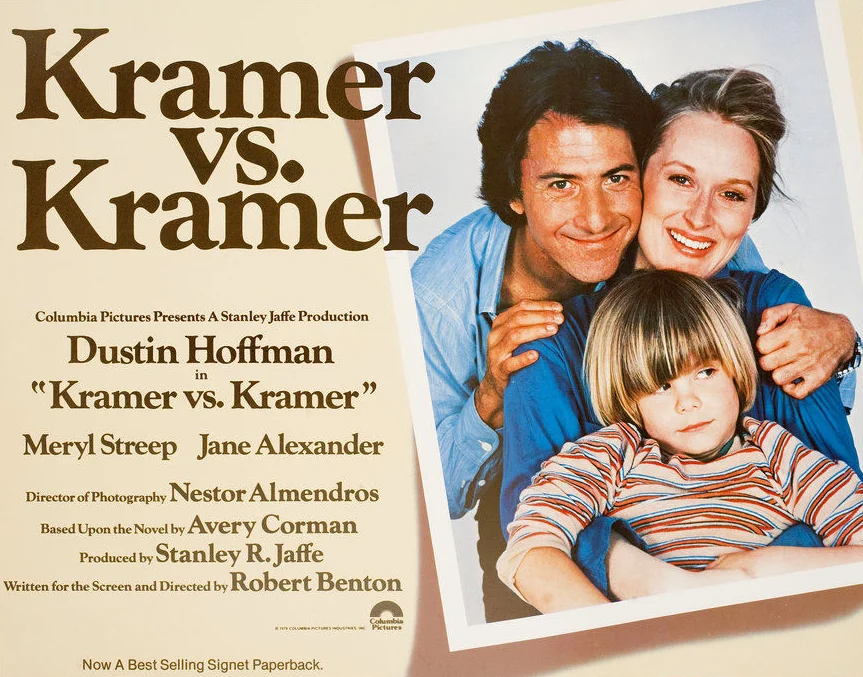
7/09:
Kramer vs. Kramer is a good film that touches upon an interesting topic in regard to child custody rights.
However, I don't like some aspects about it. One is the lack of chemistry between Dustin Hoffman and Meryl Streep. They don't
resemble divorced parents. Two is the weak relationship between father and son. All Robert Benton did is
show this and that. Well, I'm sorry, but that's not good enough. Third is the ending. Who can believe that Hollywood crap?
It doesn't exist in real world because a lot of money had been spent on the custody battle.
Dustin Hoffman's acting is good but is not among his best stuff. The boy is annoying and lacks the acting chops. Brandon
deWilde could do better. Meryl Streep, on the other hand, gives an overrated performance, having garnered some undeserved
awards. My thinking is that she got them by virtue of her looks and also pity because her former lover John Cazale had passed away
from lung cancer.
All in all, I won't go so far as to say Kramer vs. Kramer is an overrated flick, but the story is very common.
The Krays (1990)
Rate:
2
Viewed:
10/11
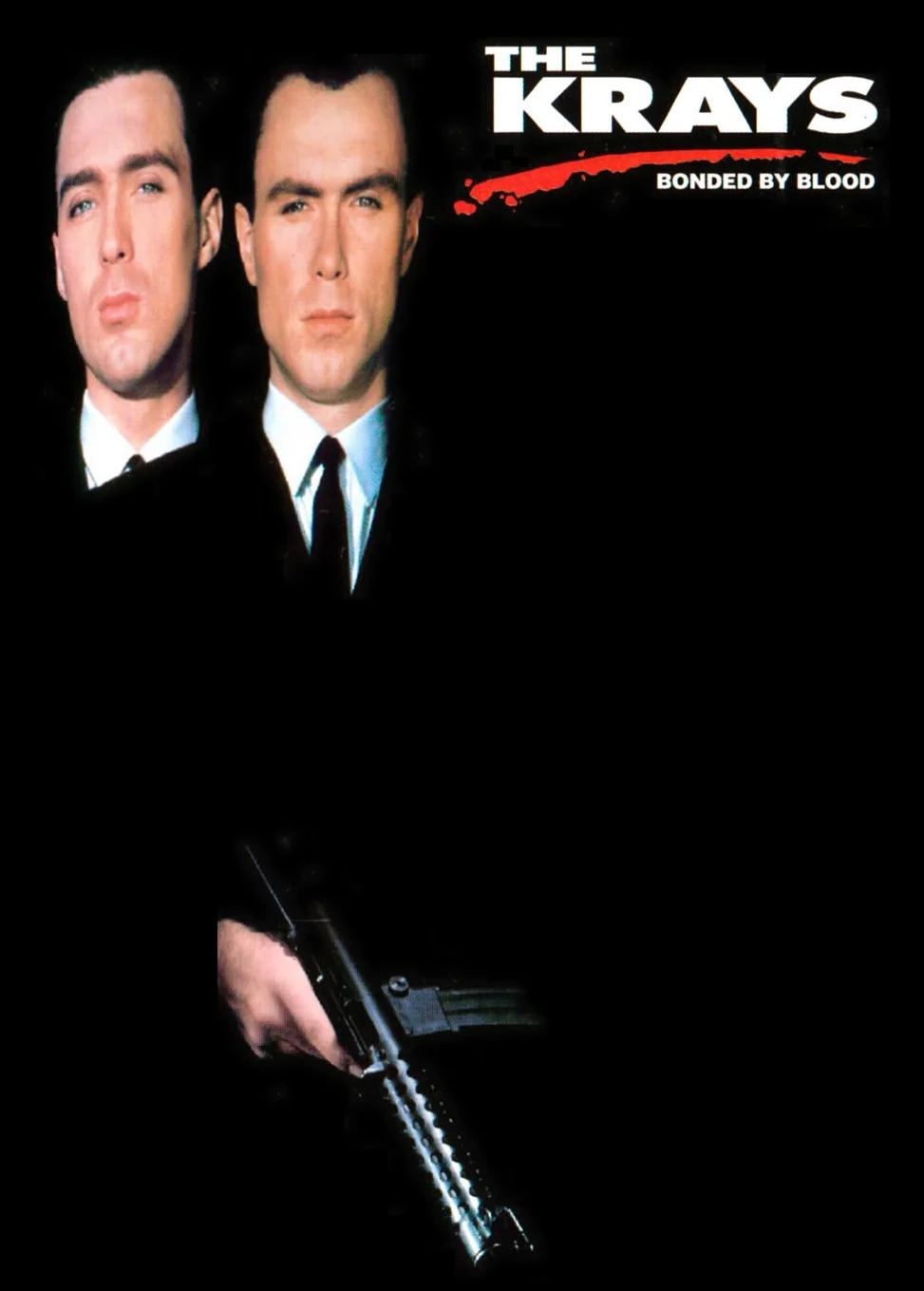
10/11:
So, I guess what The Krays is saying is that the twins were good people and that I must view them through a
different perspective.
*yawn* Yeah, right, I'm not buying this. It's one of the most poorly directed films I've seen in my life. The
scenes are so stupid that each has little meaning with one another and feels made up. I've been confused
whether the focus is supposed to be on the women or the twins.
At first, I thought I was going to see a cold-blooded, hard-hitting gangster picture. Instead, it's a lot of
women talking with an interspersed violent scene. The story as portrayed is inaccurate and also heavily glossed
over. Hence, it's been pointless when I wanted to know more about the Kray twins. There's no explanation to
why they were among the most feared gangsters in England.
All in all, Peter Medak failed to bring the Kray twins' disreputation to light.
Kuffs (1992)
Rate:
7
Viewed:
8/04
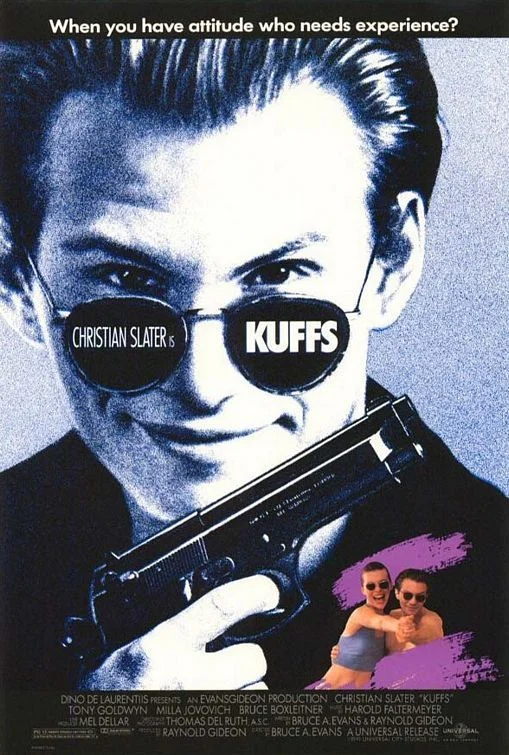
8/04:
Kuffs is an enjoyable Christian Slater film.
It has a great narration with lots of quirks and is clever. The comedy is filled with laugh-out moments that's in good fun
including the scenes of the gunshot wound and the duct tape in subtitles.
Hence, it's a smart comedy about being stupid but lucky. Christian Slater is fantastic who has a certain
"Johnny Depp" quality. Kuffs, along with Gleaming the Cube, has solidified
me as a big fan of his stuff.
All in all, I give kudos to Bruce Evans for his witty direction in Kuffs.